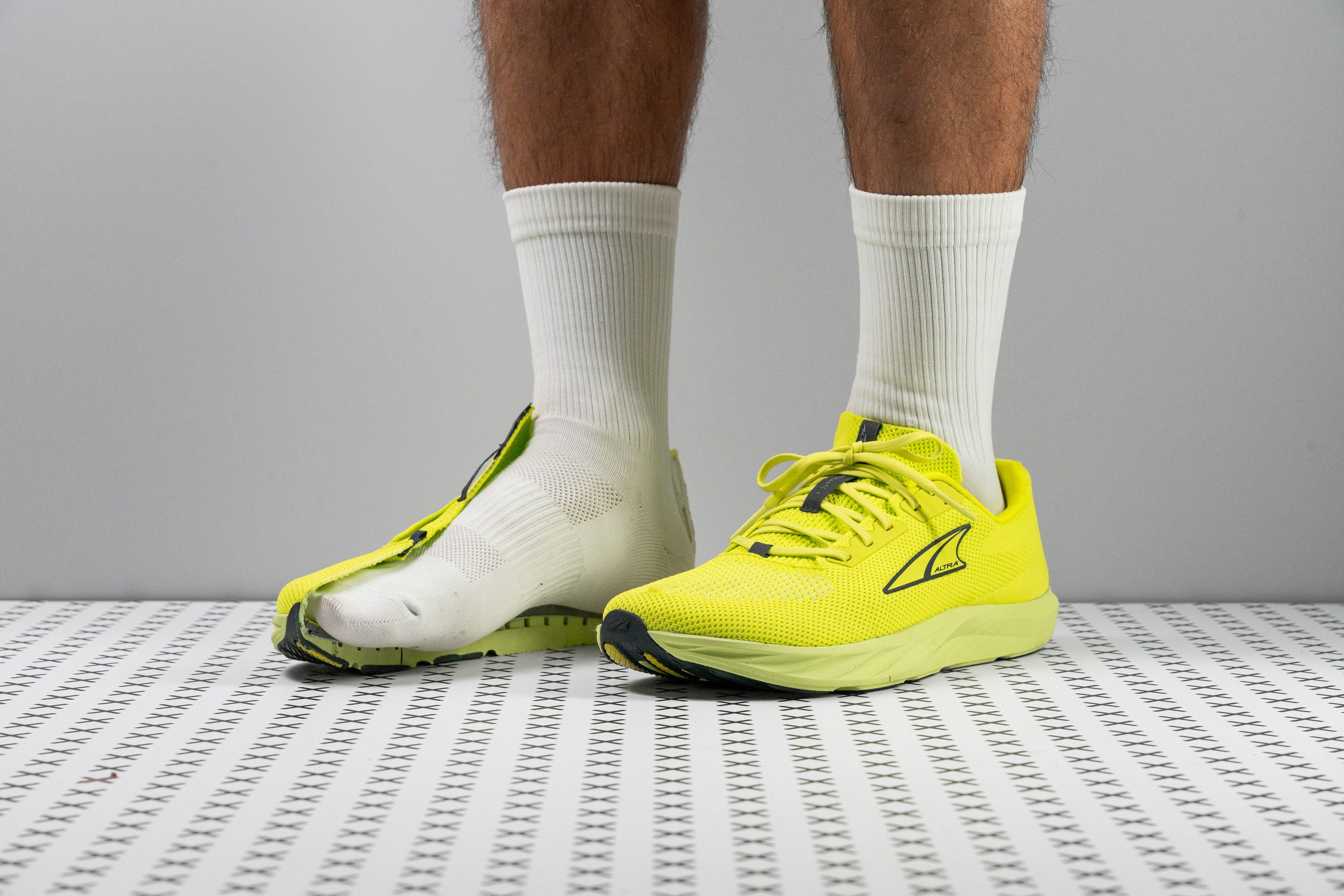Our verdict
- Top pick in best running shoes for bunions
- Top pick in best shoes for gym and running
Pros
- Minimalist, flexible ride
- Outstanding outsole
- Spacious extra-wide toebox
- Superb stability
- Lightweight
- Highly durable upper
- Recaptures Escalante 1.5 vibes
Cons
- Poor ventilation
- Non-gusseted tongue
- Not ideal for long distance training
Audience verdict
- Top 24% most popular running shoes
Comparison
The most similar running shoes compared
+ + Add a shoe | |||||
|---|---|---|---|---|---|
| Audience score | 83 Good! | 84 Good! | 90 Superb! | 75 Bad! | |
| Price | $130 | $135 | $130 | $75 | |
| Pace | Daily running | Daily runningTempo | Daily runningTempo | Daily running | |
| Shock absorption | Low | Moderate | High | Low | |
| Energy return | Moderate | Low | Moderate | Low | |
| Traction | High | High | High | Moderate | |
| Arch support | Neutral | Neutral | Neutral | Neutral | |
| Weight lab Weight brand | 8.4 oz / 237g 9.5 oz / 269g | 7.7 oz / 217g 7.6 oz / 215g | 8.6 oz / 245g 8.4 oz / 238g | 8.5 oz / 241g 8.5 oz / 240g | |
| Lightweight | ✓ | ✓ | ✓ | ✓ | |
| Drop lab Drop brand | 1.4 mm 0.0 mm | 5.9 mm 5.0 mm | 8.2 mm 9.0 mm | 6.0 mm 6.0 mm | |
| Strike pattern | Mid/forefoot | Mid/forefoot | HeelMid/forefoot | Mid/forefoot | |
| Size | True to size | Half size small | Half size small | True to size | |
| Midsole softness | Balanced | Soft | Balanced | Firm | |
| Difference in midsole softness in cold | Normal | Small | Small | Small | |
| Toebox durability | Good | Bad | Bad | Decent | |
| Heel padding durability | Good | Good | Good | Good | |
| Outsole durability | Good | Decent | Decent | Bad | |
| Breathability | Moderate | Breathable | Breathable | Moderate | |
| Width / fit | Wide | Wide | Wide | Medium | |
| Toebox width | Wide | Wide | Medium | Medium | |
| Stiffness | Flexible | Moderate | Moderate | Flexible | |
| Torsional rigidity | Flexible | Stiff | Moderate | Flexible | |
| Heel counter stiffness | Flexible | Moderate | Flexible | Flexible | |
| Heel lab Heel brand | 23.8 mm 24.0 mm | 32.8 mm 34.5 mm | 34.9 mm 35.0 mm | 25.9 mm | |
| Forefoot lab Forefoot brand | 22.4 mm 24.0 mm | 26.9 mm 29.5 mm | 26.7 mm 26.0 mm | 19.9 mm | |
| Widths available | Normal | Normal | NormalWide | NormalWideX-Wide | |
| Orthotic friendly | ✓ | ✓ | ✓ | ✓ | |
| Season | All seasons | SummerAll seasons | SummerAll seasons | All seasons | |
| Removable insole | ✓ | ✓ | ✓ | ✓ | |
| Ranking | #266 Bottom 30% | #249 Bottom 35% | #46 Top 12% | #362 Bottom 5% | |
| Popularity | #92 Top 24% | #135 Top 36% | #182 Top 48% | #62 Top 17% |
Who should buy
We believe the Altra Escalante 4 is a fantastic running shoe for:
- Zero drop enthusiasts seeking a stable shoe that delivers an awesome ground feel.
- Those in need of a versatile, low-drop shoe ideal for walking, some gym activities and, of course, running!
- Loyal fans of the Escalante series who were let down by the previous model, as this version returns to the beloved features of the 1.5.
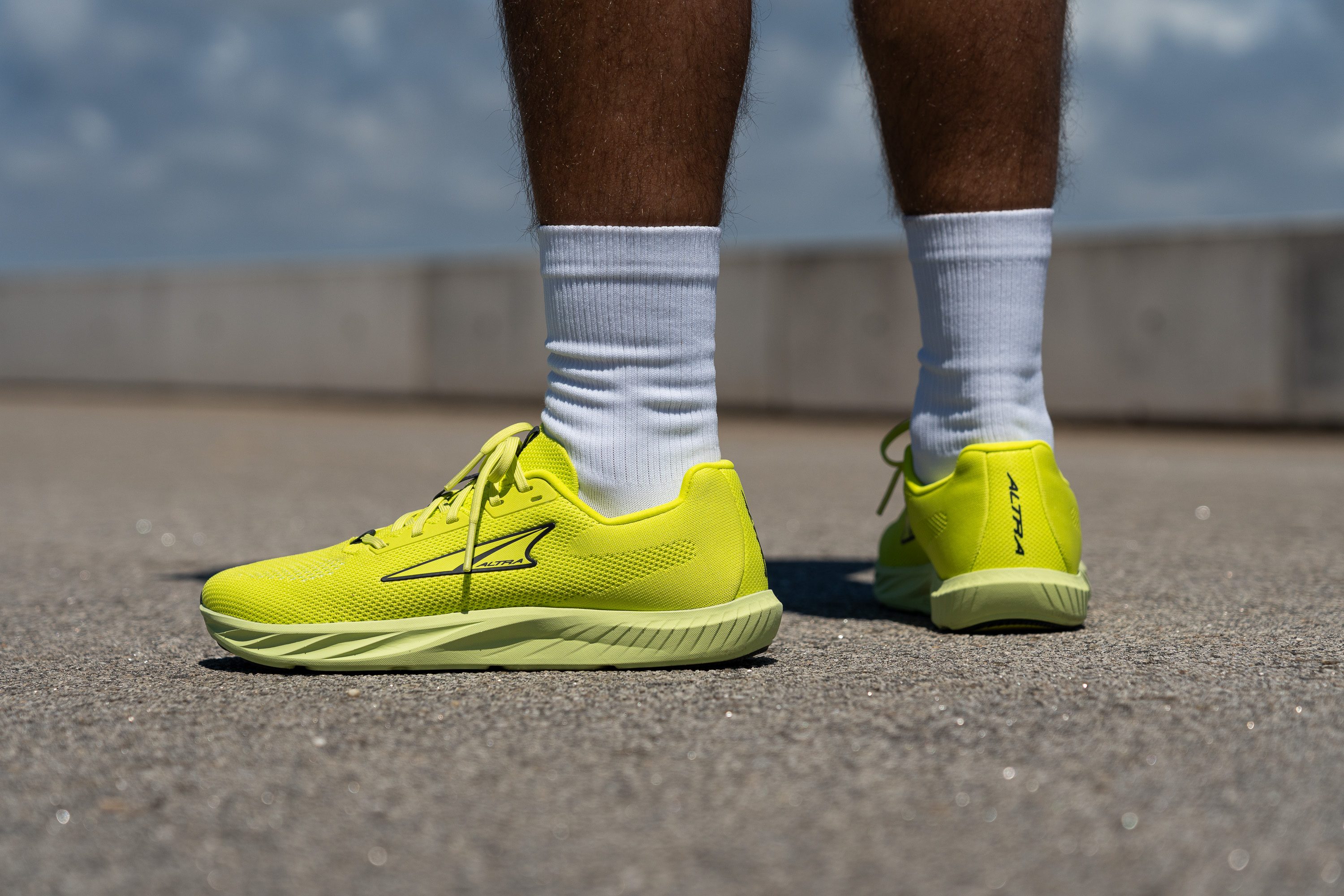
Who should NOT buy
As a zero-drop shoe, the Escalante 4 may not suit runners with recurring Achilles or calf issues. If that's you, we suggest the Nike Flex Experience Run 12, which offers a flexible ride paired with a higher drop—ideal for better heel support.
If you’re chasing a low-stack shoe that really pops with bounce, we think that the Adidas Adizero Adios 9 would be a stronger pick.
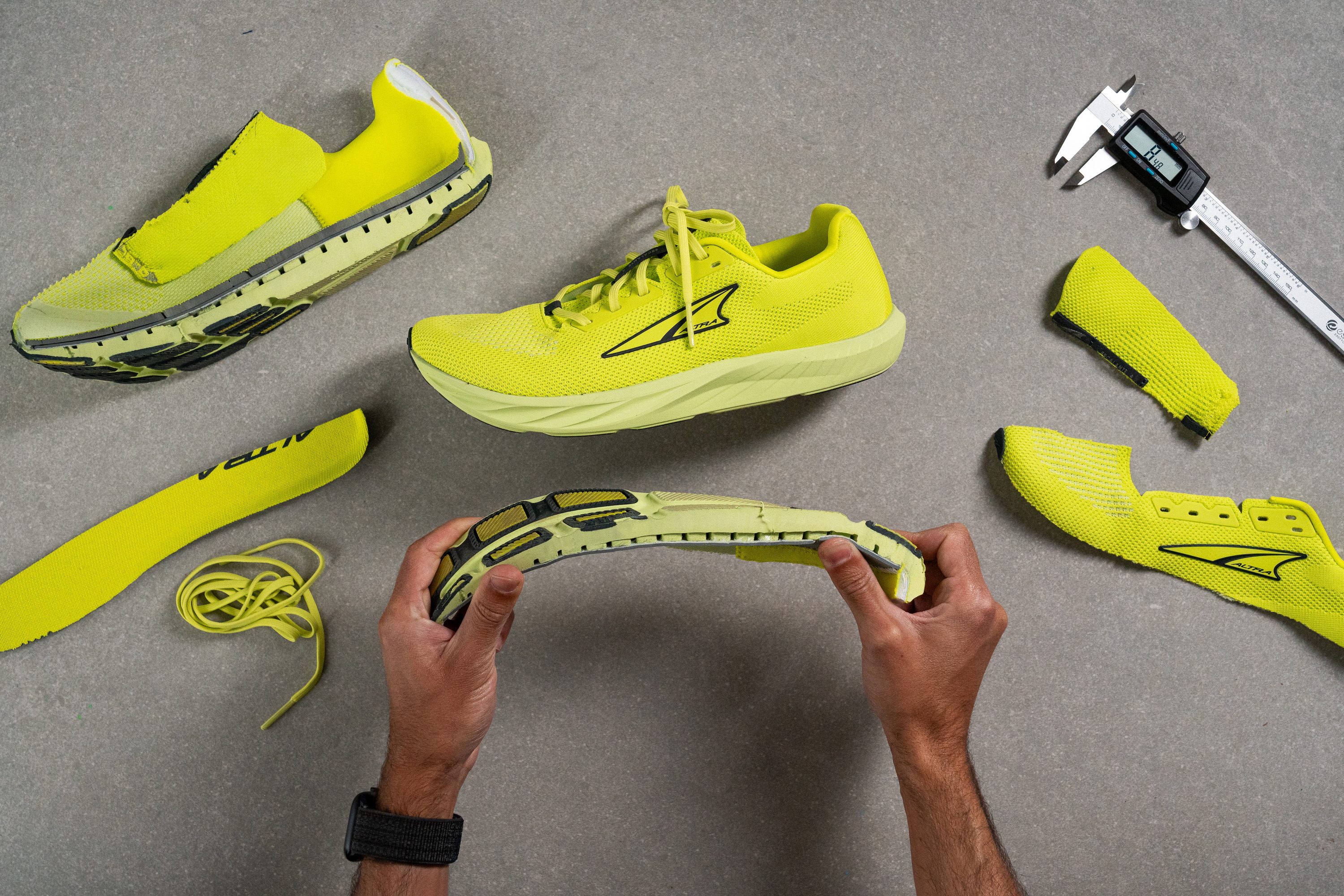
Cushioning
Shock absorption
We found low shock absorption in the Escalante 4, but that came as no surprise. Altra has consistently kept this series low to the ground with a minimal stack, prioritizing natural movement and ground feel over plush cushioning.
Our test confirmed just 101 SA in the heel and 83 SA in the forefoot—numbers that reflect its ground-connected design. Of course, this setup isn’t for everyone, but it perfectly fits the needs of Escalante fans.

| Escalante 4 | 101 SA |
| Average | 130 SA |
Energy return
We found energy return to be decent: 58.5% in the heel and 62.5% in the forefoot. While these numbers won’t blow anyone away, they’re still perfectly acceptable for everyday runs, especially at the price point of the Escalante 4.
| Escalante 4 | 58.5% |
| Average | 58.6% |
Heel stack
The Escalante 4 features a heel with a relatively low stack height of just 23.8 mm, at least by today's standards.
Though this may seem low, it's crucial to remember that Altra tailors its shoes with a zero-drop design, so heel cushioning is not that important because most runners should strike the ground with the midfoot or forefoot with this shoe.
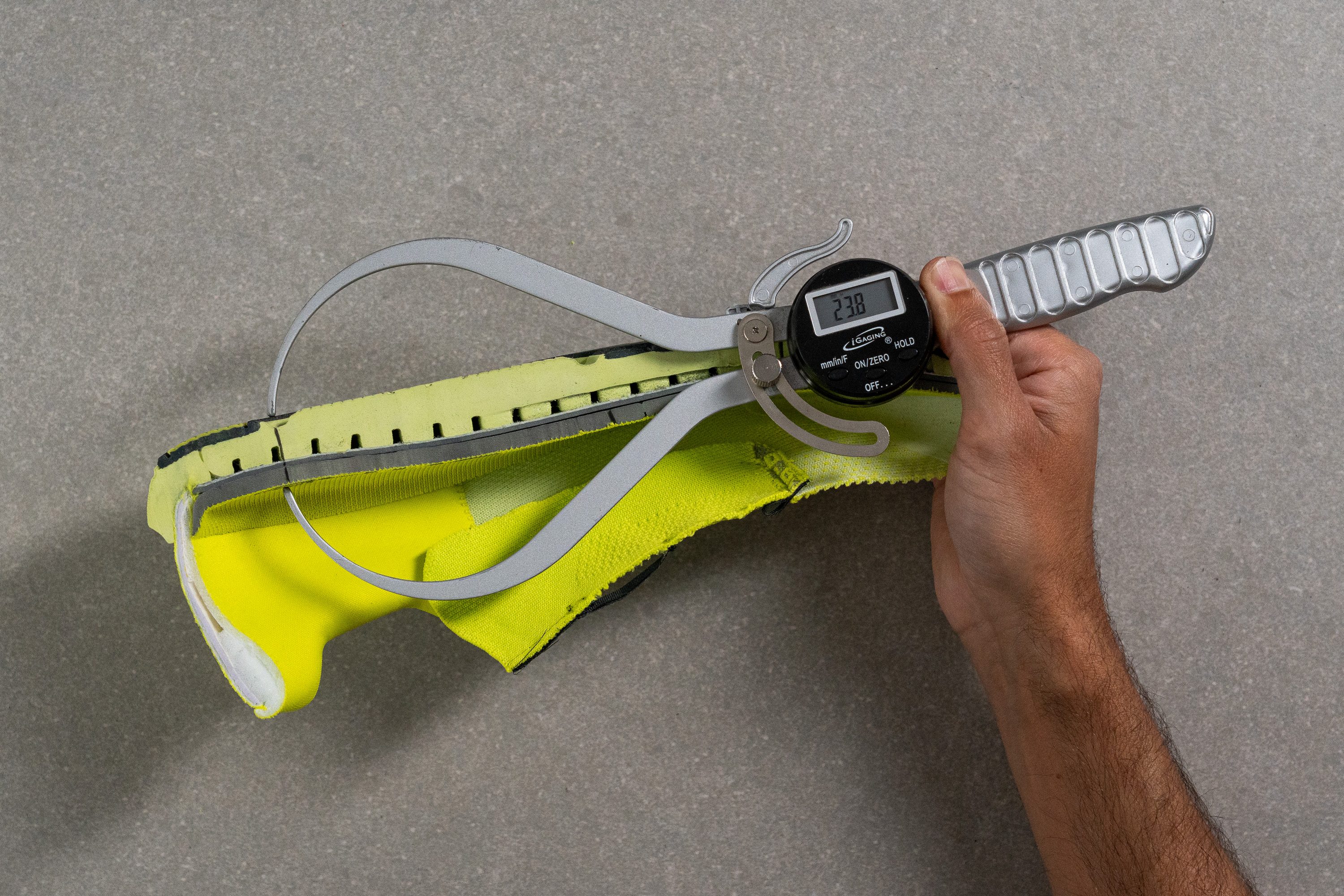
| Escalante 4 | 23.8 mm |
| Average | 34.8 mm |
Forefoot stack
The forefoot of the Escalante 4 maintains a similar profile at 22.4 mm, perfect for those seeking a ride that’s a bit cushioned yet still feels very connected to the ground.
Additionally, the photo below clearly shows what we previously discussed during the outsole thickness test—the rubber is integrated into the foam rather than merely being glued on top.
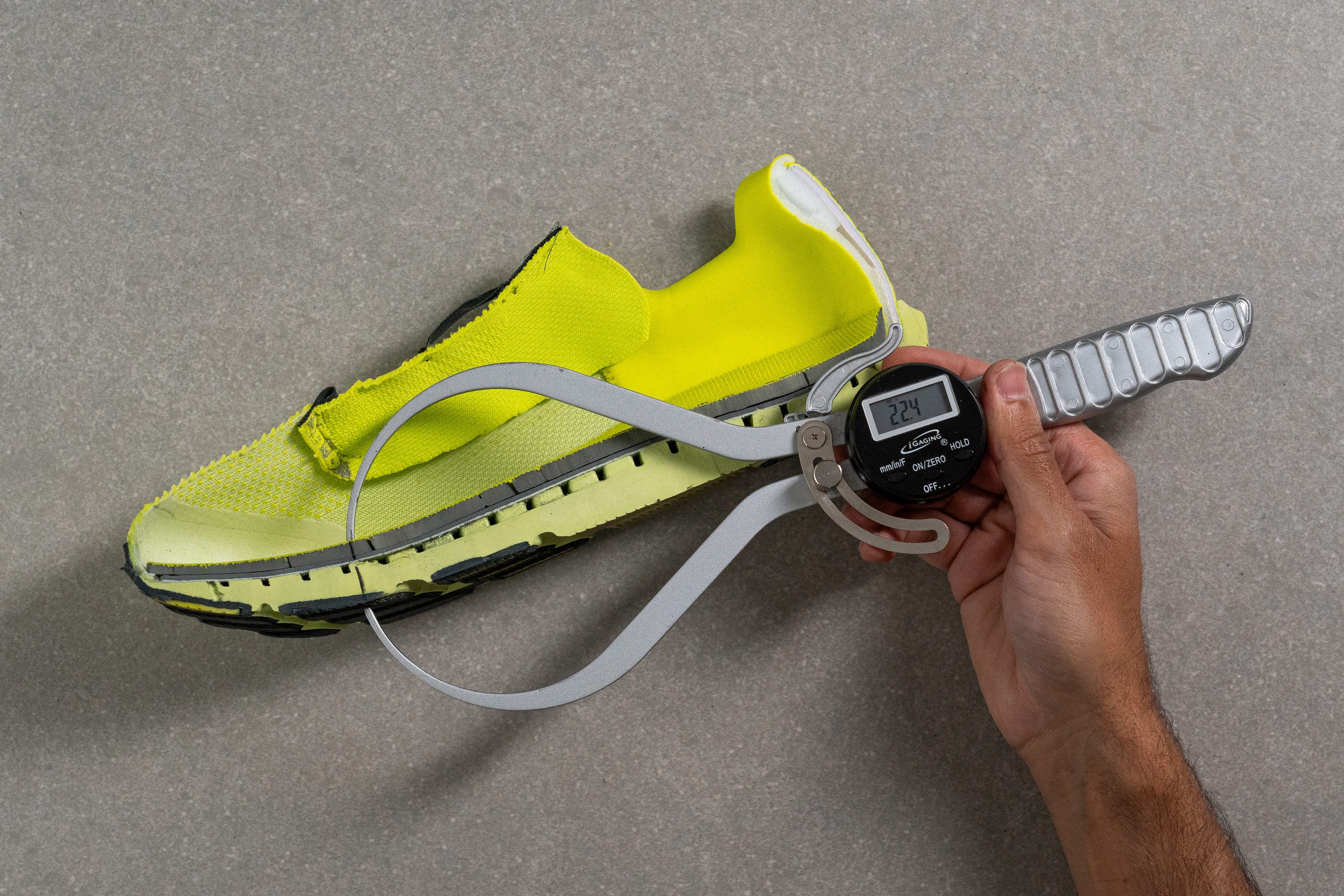
| Escalante 4 | 22.4 mm |
| Average | 26.2 mm |
Drop
We discovered a 1.4-mm heel-to-toe drop in the Escalante 4, which is acceptable for a zero-drop shoe due to slight manufacturing variations or foam compression.
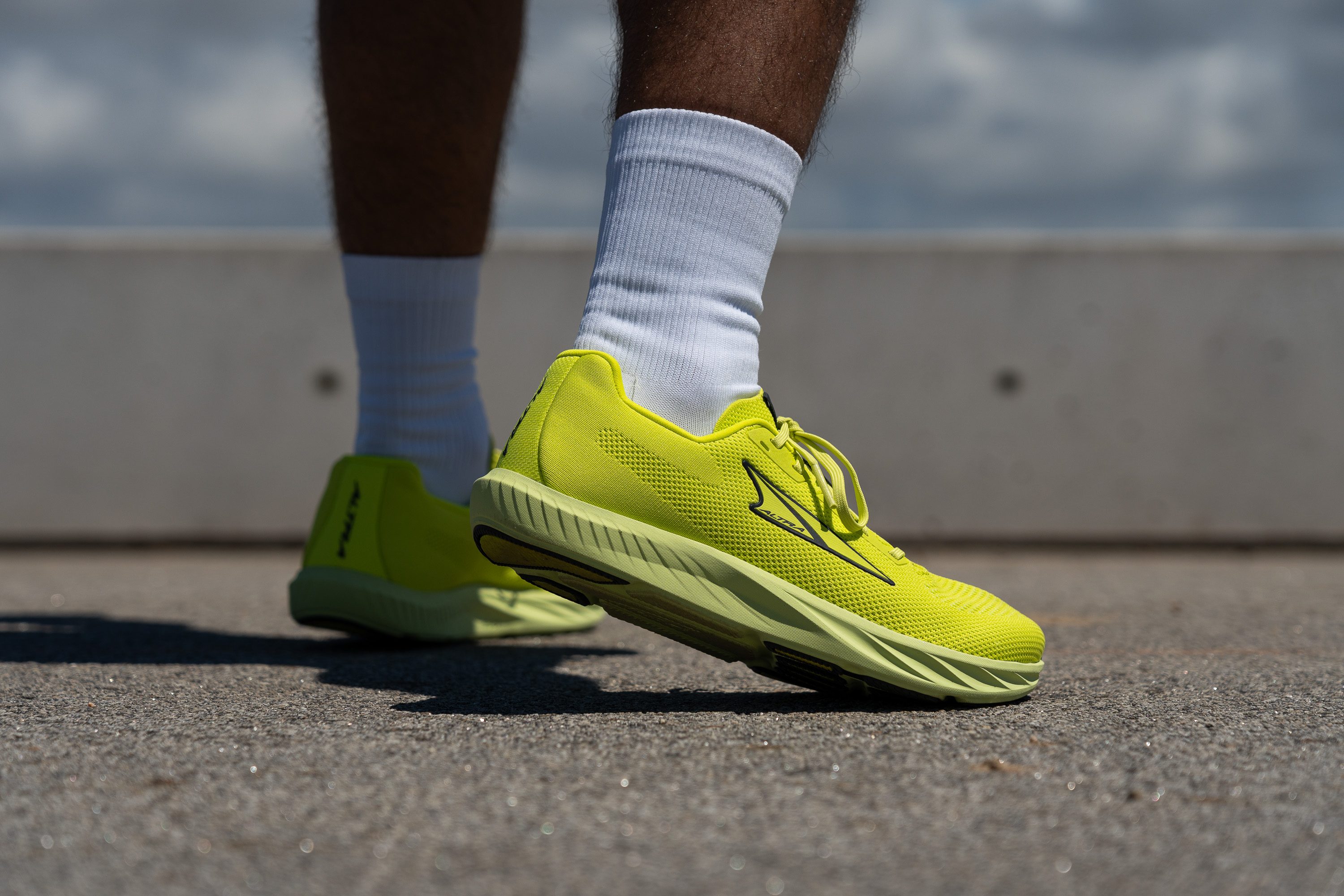
Given this minimal drop, the shoe isn't suited for everyone. Zero-drop footwear caters to those who are comfortable with such an offset. For newcomers to this group, we recommend gradually integrating this shoe into your routine to ease the transition, starting just walking and then gradually increasing running.
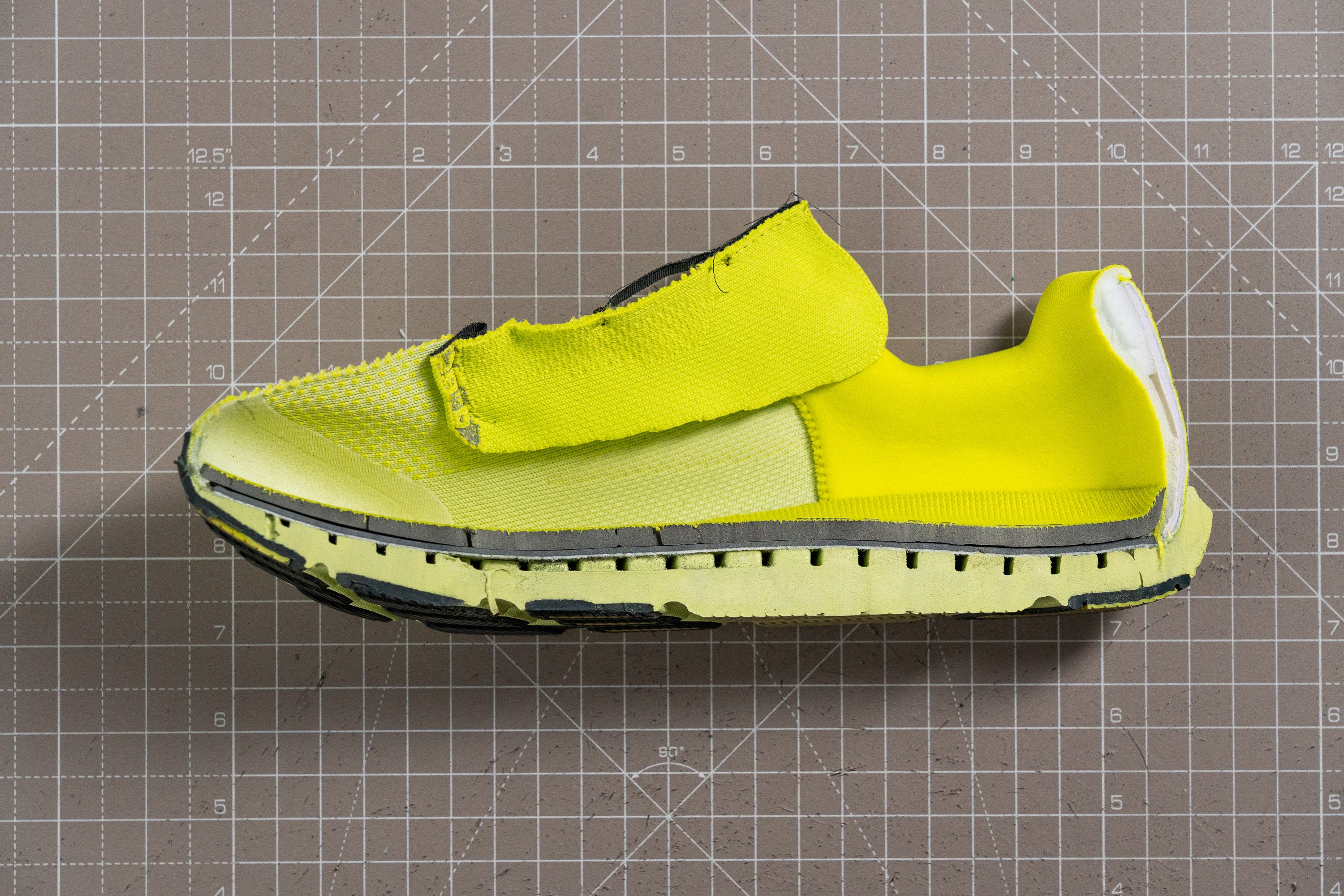
| Escalante 4 | 1.4 mm |
| Average | 8.6 mm |
Midsole softness
UpdatedMoving to the midsole, we discovered that Altra employs its standard EGO foam, which offers a balance between a firm and balanced feel at 39.9 AC.
For those who favor plush midsoles, the Escalante 4 won't meet expectations. However, we advise against soft midsoles in low-stack shoes, as softer foam could lead to bottoming out and discomfort. If you're seeking a plush yet low-drop option, the Altra Via Olympus 2 provides a cloud-like ride with a zero-drop design.
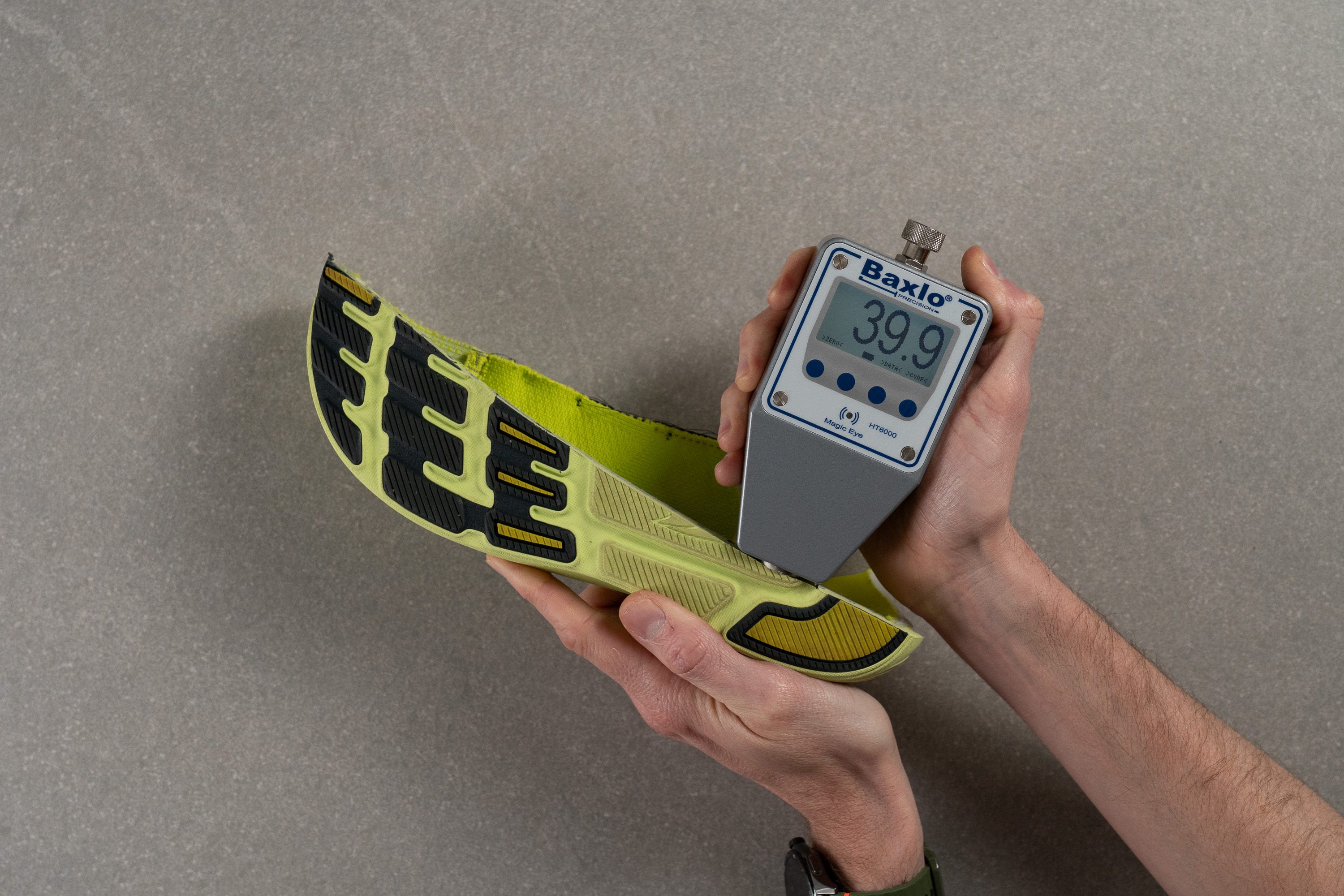
| Escalante 4 | 39.9 AC |
| Average | 36.3 AC |
Size and fit
Size
Altra Escalante 4 fits true to size (81 votes).
Internal length
| Escalante 4 | 270.2 mm |
| Average | 269.4 mm |
Width / Fit
Our expectations were sky-high for the spaciousness of the upper, as the Escalante 4 boasts Altra's Original FootShape—the brand's roomiest design.
That's why we weren't surprised to measure 101.0 mm at the widest part of our gel mold, providing ample room for those blessed(?) with ultra-wide feet.
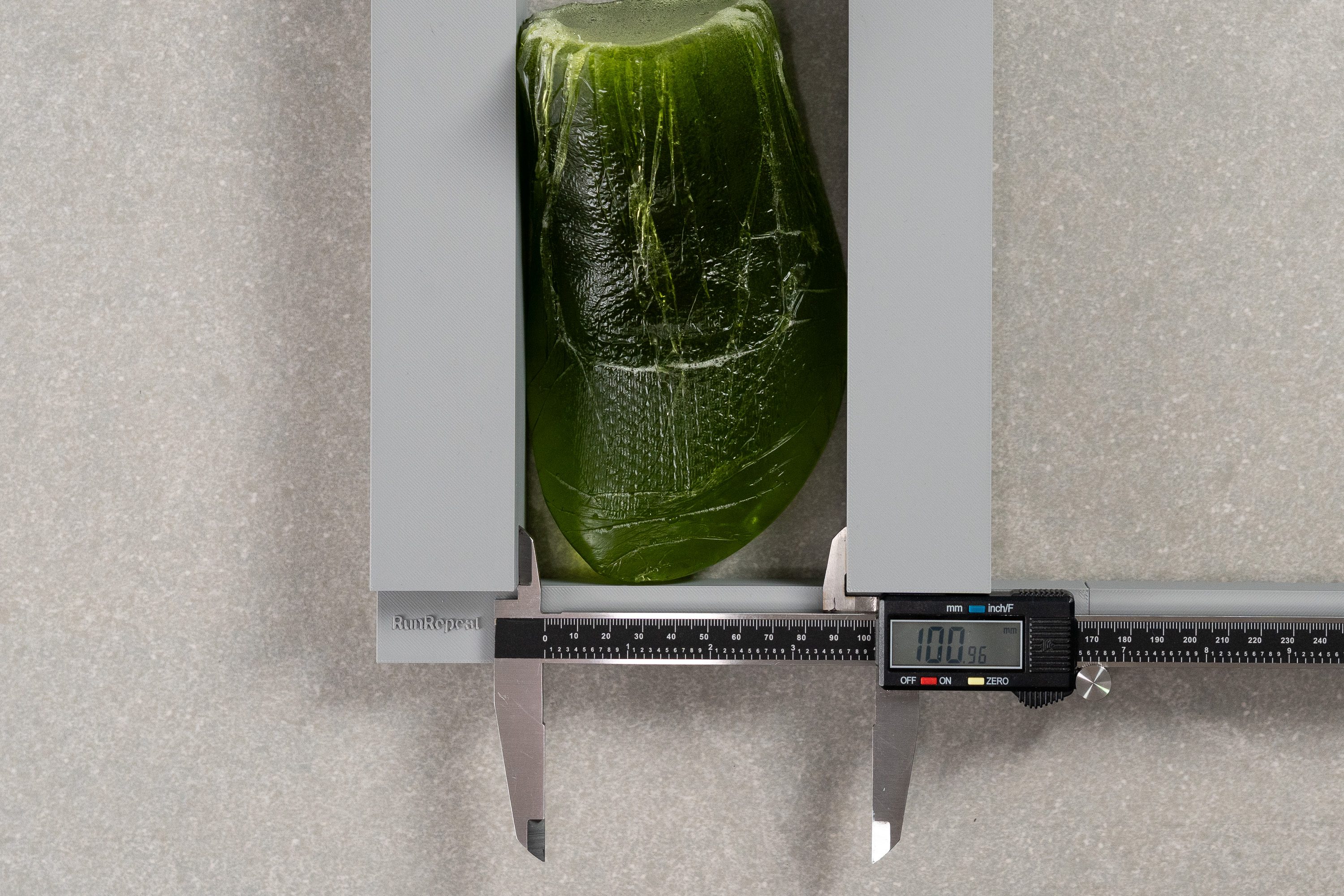
| Escalante 4 | 101.0 mm |
| Average | 95.2 mm |
Toebox width
Yet, as with every Altra, our second measurement at the big toe reveals the true fit. At 82.4 mm, the Original FootShape design springs to life, offering a massively roomy fit.
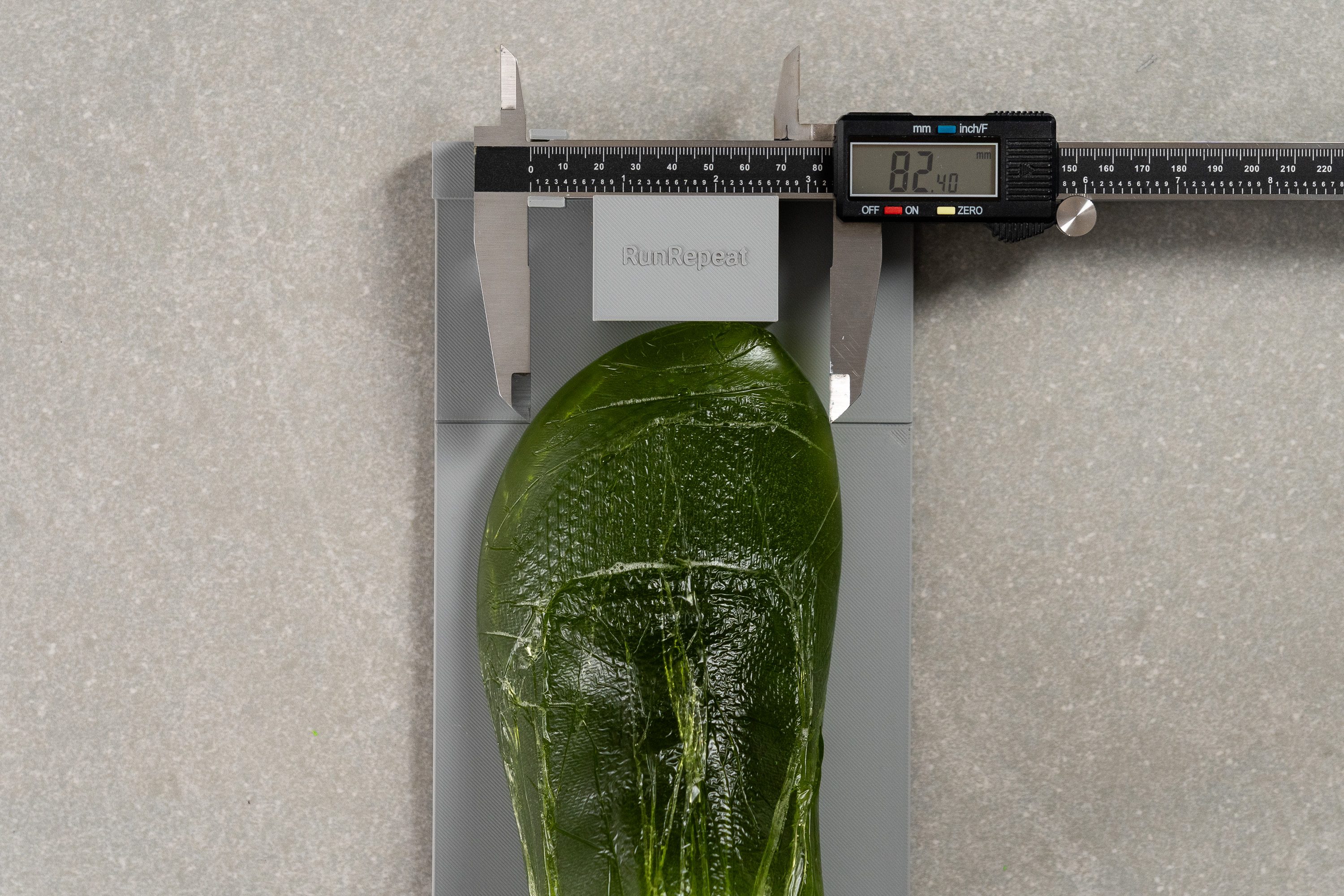
| Escalante 4 | 82.4 mm |
| Average | 73.3 mm |
Toebox height
On the flip side, the Escalante 4 sits fairly low in the toe area at 25.4 mm, though we didn’t find it problematic thanks to its stretchy knit upper. However, if you’re someone who dislikes feeling the upper on your toes, this might be a concern.
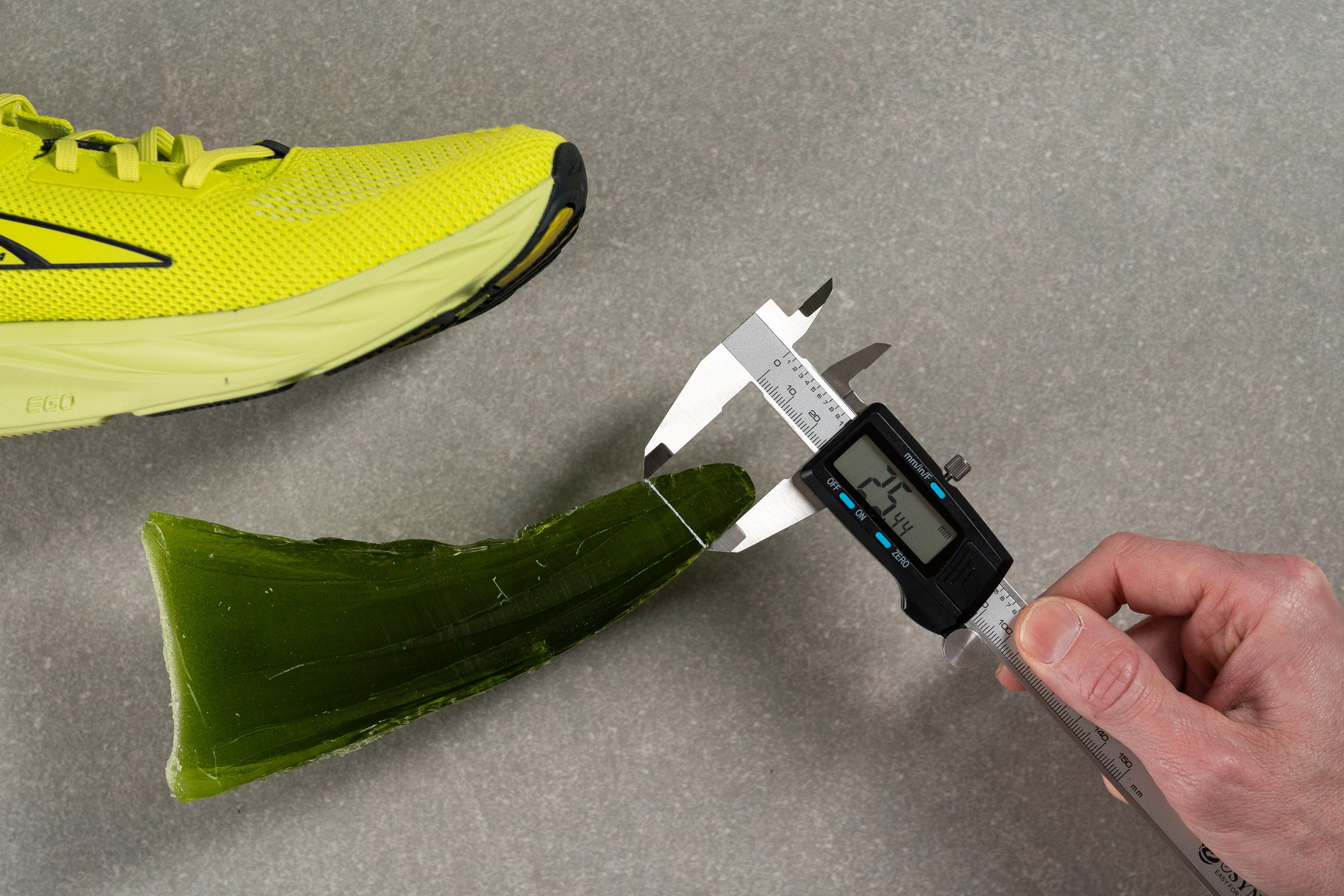
| Escalante 4 | 25.4 mm |
| Average | 27.1 mm |
Traction / Grip
Traction test
We tested the Escalante 4’s outsole under wet conditions using our custom SATRA TM144 setup—applying 500N of force on a 7-degree wedge.
After filtering outliers and averaging consistent runs, we recorded a friction score of 0.58. That result puts it above the average road shoe in grip and confirms that this zero-drop trainer is more than capable on rainy-day runs.
| Escalante 4 | 0.58 |
| Average | 0.49 |
Outsole design
If you’re after a running shoe that flexes naturally with your feet, the Escalante 4’s INNERFLEX outsole design gets the job done.
That’s thanks to the FootPod outsole, which mirrors the foot’s shape and movement. However, keep in mind the exposed foam in the midfoot—it might wear down quickly if you tend to be rough on your outsoles in that area.
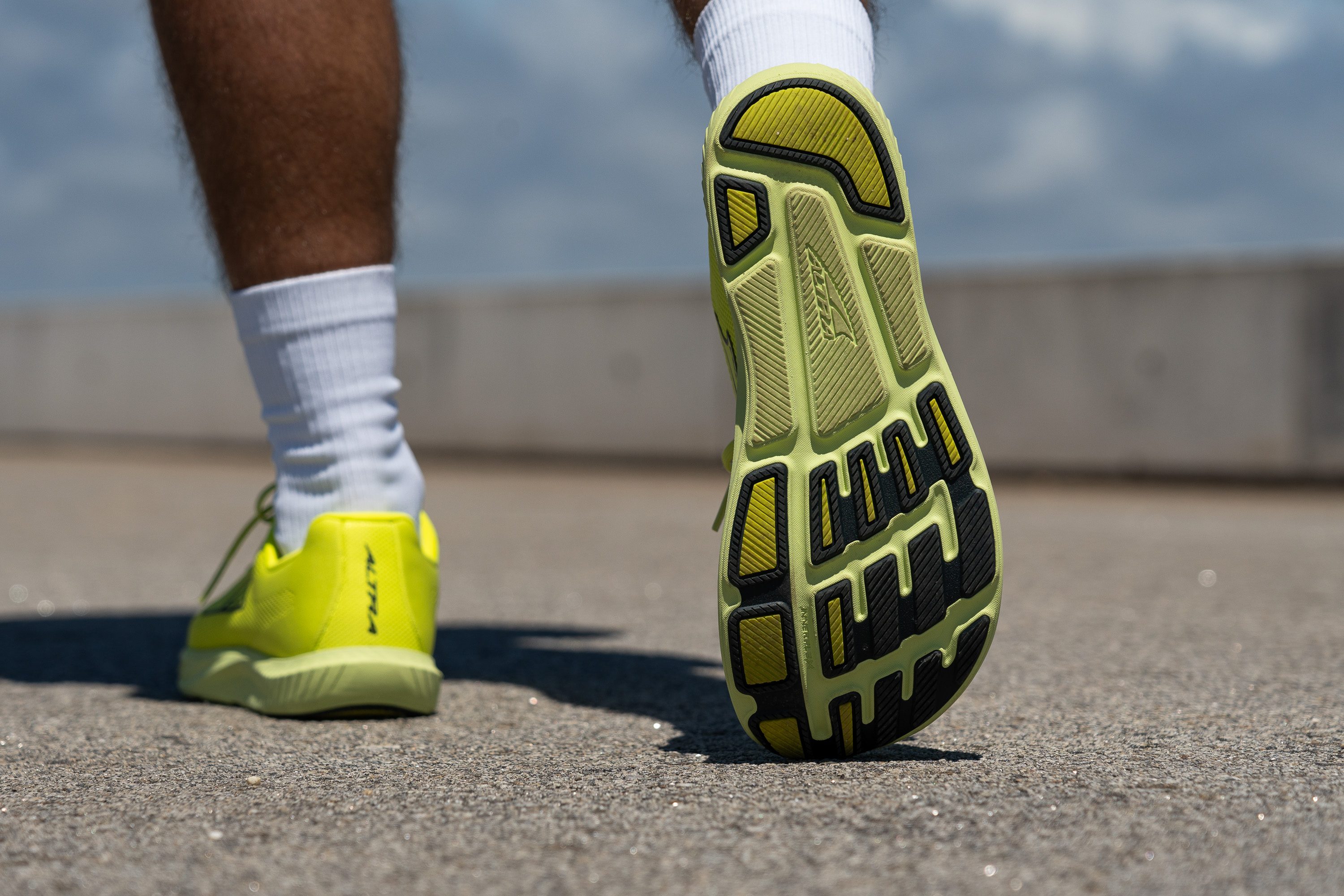
Flexibility / Stiffness
We previously discovered that the shoe flexed impressively in our torsional test, yet we still needed to evaluate how it performed in our bend machine, where we measure resistance with a force gauge in Newtons.
Following the test, we recorded a force of 8.2N, confirming the shoe's exceptional flexibility!
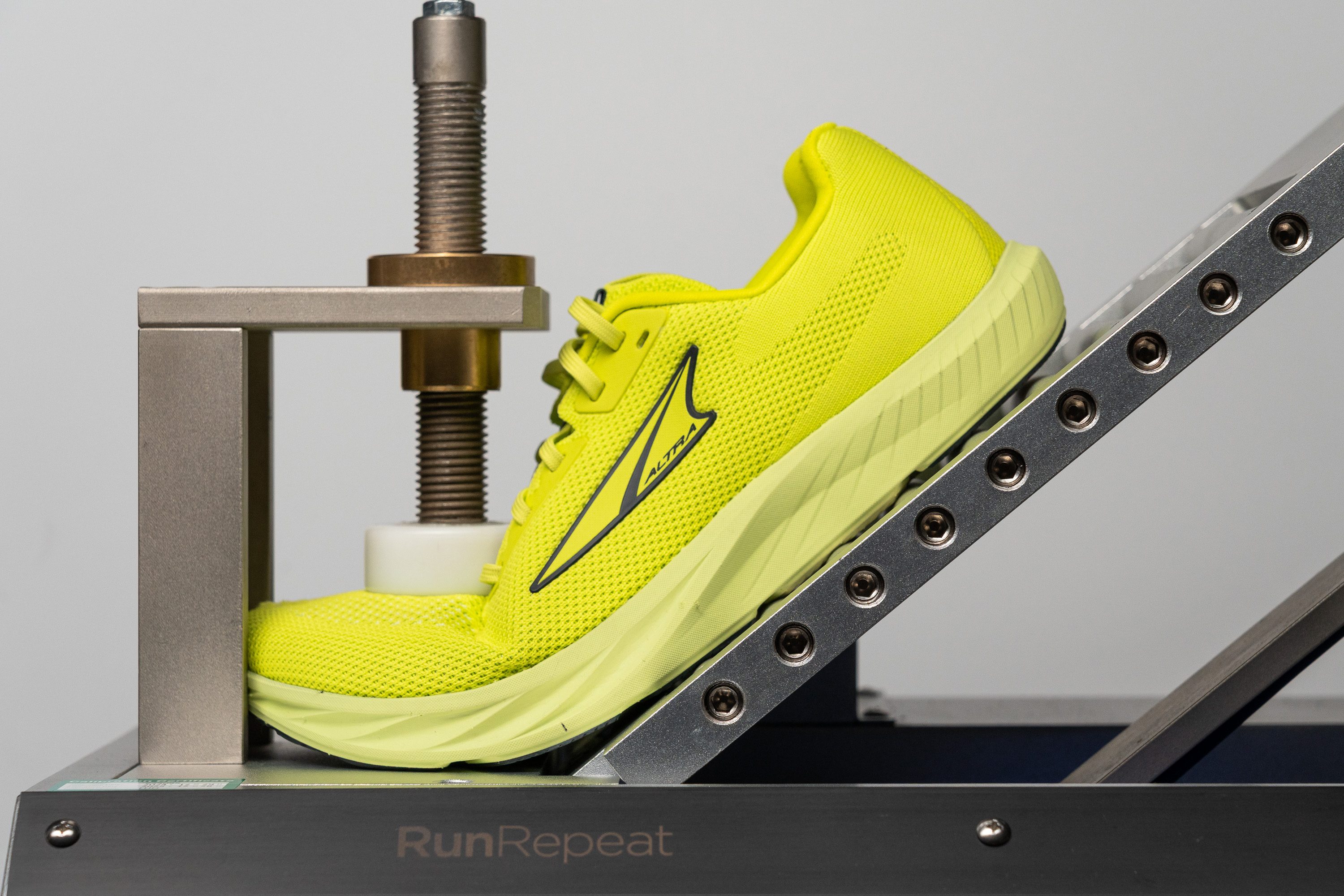
| Escalante 4 | 8.2N |
| Average | 15.4N |
Weight
While we previously suggested that Altra might consider reducing some weight from the Escalante 4, it’s not something that worries us at all.
At just 8.4 oz (237g), the E4 is remarkably lightweight, although any improvement in the next update would be appreciated here in the lab!
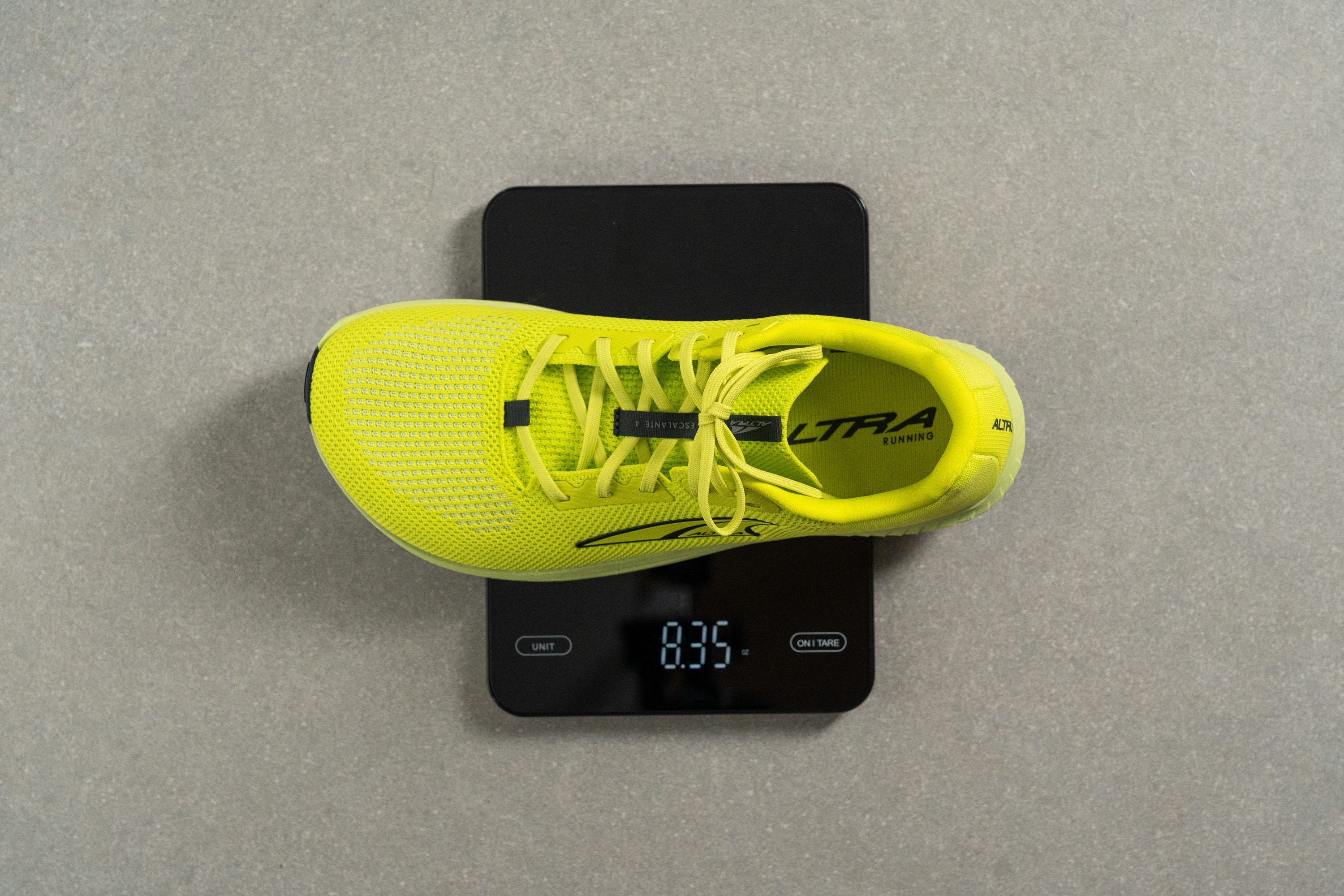
| Escalante 4 | 8.4 oz (237g) |
| Average | 9.3 oz (264g) |
Breathability
The Escalante 4 replaces the mesh upper of its predecessor with a more comfortable knit upper. Initially, we were concerned that, as is common with knit uppers, this change might reduce ventilation. To verify this, we conducted a series of lab tests.
In our initial evaluation with the upper, we employed a smoke-pumping machine to assess the shoe's ventilation capabilities. This test clearly demonstrated that air flow was less effective than we hoped. As a result, we assigned a modest rating of 3 out of 5, indicating that while the shoe provides some ventilation, it falls short of providing optimal breathability.
Using a simple light test, we discovered another significant reason for the reduced ventilation—the knit is much thicker and more structured when compared to the Racer, with reinforced areas in the toebox, arch, and heel to enhance durability and stability.
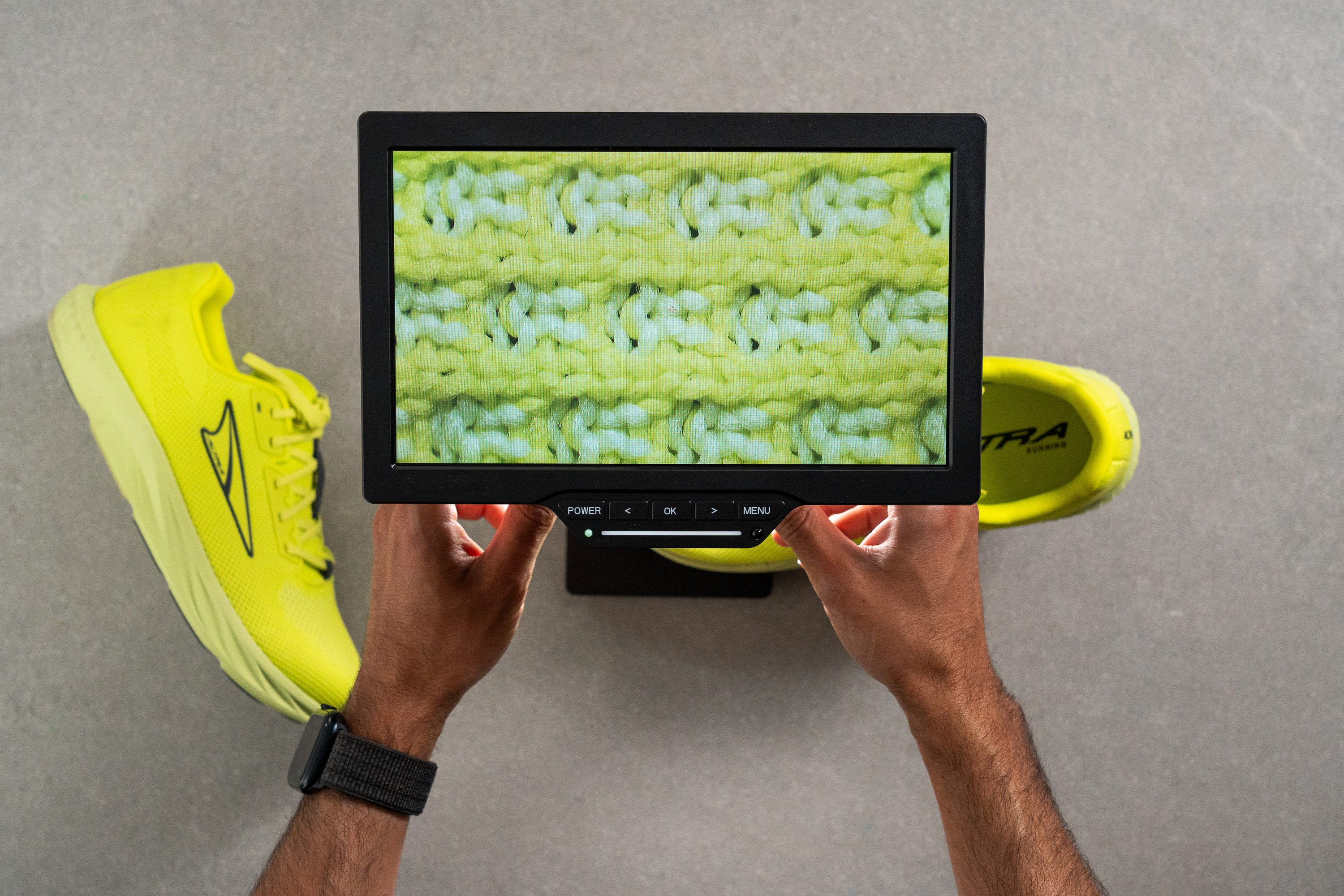
However, to fully understand this issue, we need to use multiple tools. Examining the shoe under a microscope, we found the knit to be extremely cozy, yet lacking in sufficient gaps for air and moisture to escape.
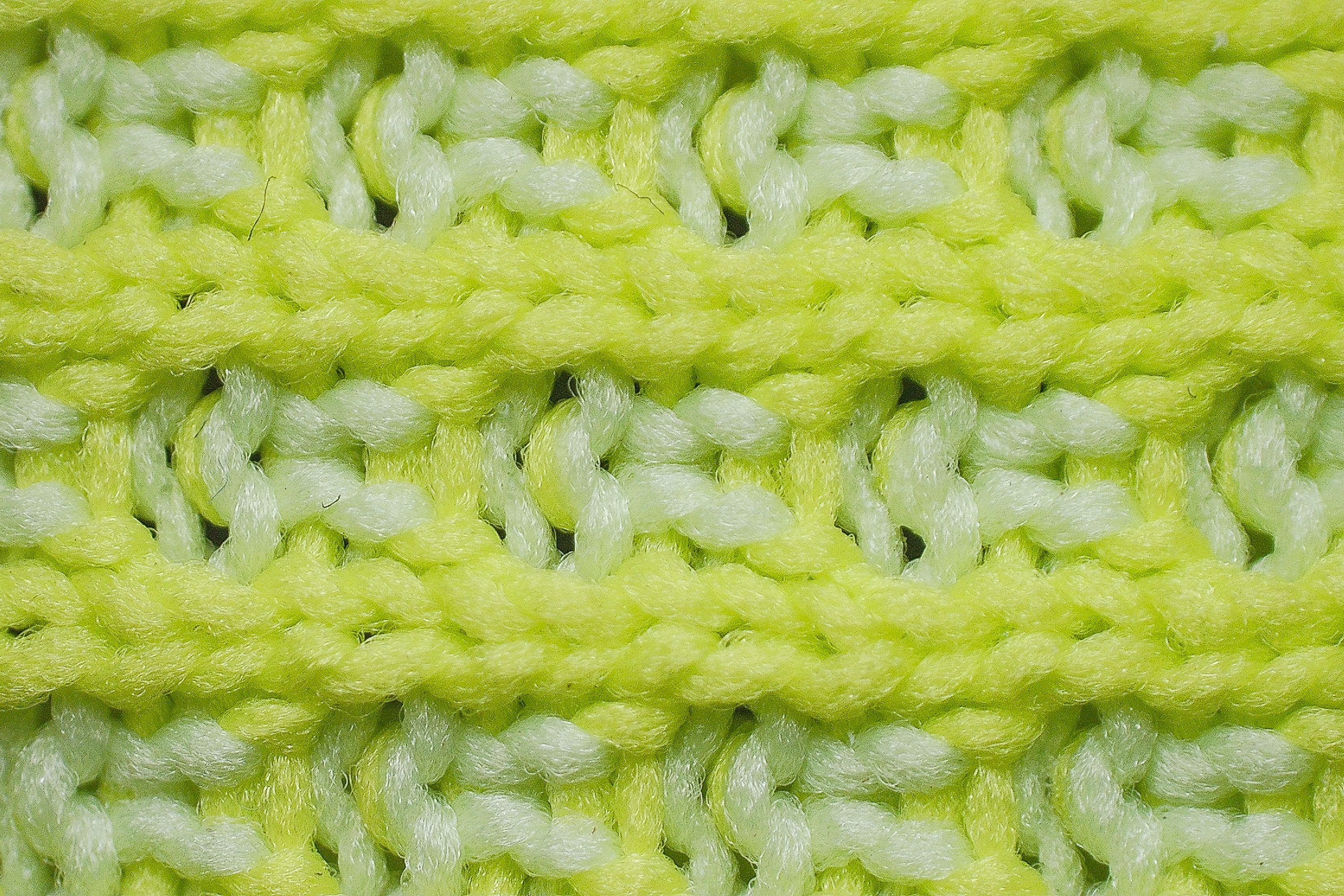
In our hands-on assessment, we appreciated the upper's stretchiness and how well it conforms to the feet. However, don't expect it to be ultra-padded, as it's clearly designed for being lightweight.
However, it's clear this shoe is best suited for runners who avoid extremely hot conditions.
| Escalante 4 | 3 |
| Average | 3.7 |
Stability
Lateral stability test
One of the key benefits of a shoe that keeps you close to the ground is the immediate increase in stability compared to average running shoes. We can confirm that the Escalante 4 provides a remarkably stable ride for neutral runners.
Torsional rigidity
The Escalante 4 bends and flexes like crazy, scoring a 1/5 from us, which is a crucial component of its natural feel and comfort. And while its flexibility might detract from stability, the low stack height naturally enhances this aspect without necessitating a rigid structure at all.
| Escalante 4 | 1 |
| Average | 3.5 |
Heel counter stiffness
The heel counter is neither intrusive nor overwhelming; in fact, it's quite the opposite. It collapsed to our slight pressure, prompting us to rate it just 2 out of 5.
| Escalante 4 | 2 |
| Average | 2.9 |
Midsole width - forefoot
Returning to the midsole, we measured its dimensions using calipers, starting with the forefoot.
Our initial measurement revealed a very wide platform at 118.3 mm, which undoubtedly contributes to the remarkable secure feel we experienced during landings on our runs.
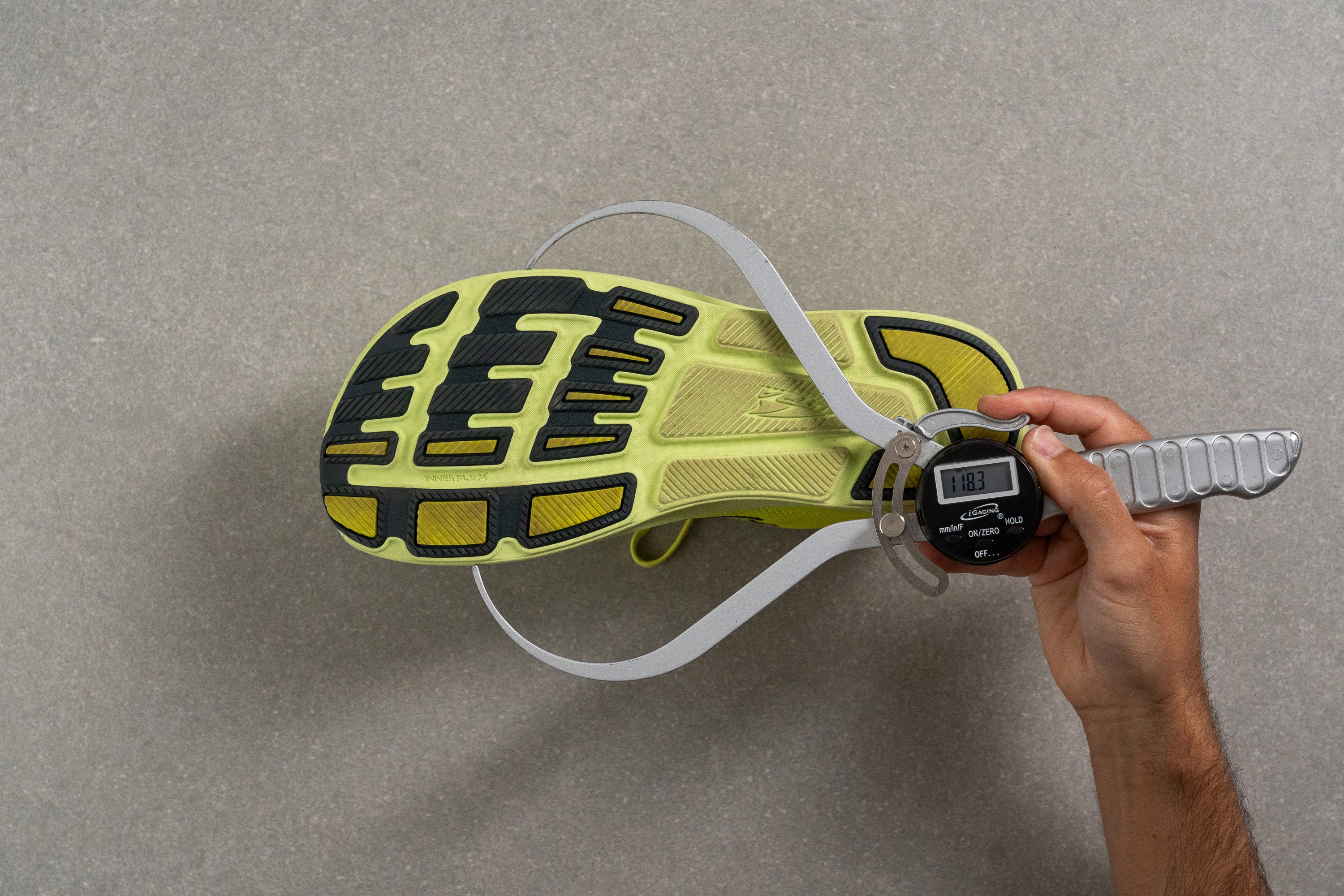
| Escalante 4 | 118.3 mm |
| Average | 114.4 mm |
Midsole width - heel
Discovering a narrow heel measurement of 82.5 mm on the shoe was not a shock to us in the lab. It seems Altra relies on the stability provided by its moderately firm midsole, and low-drop configuration—all tailored to enhance stability and reflect the natural shape of the foot.
This narrower heel may not suit extreme heel strikers though, but it's likely that such runners may have been attracted to the Escalante series, considering that it's a zero-drop shoe.
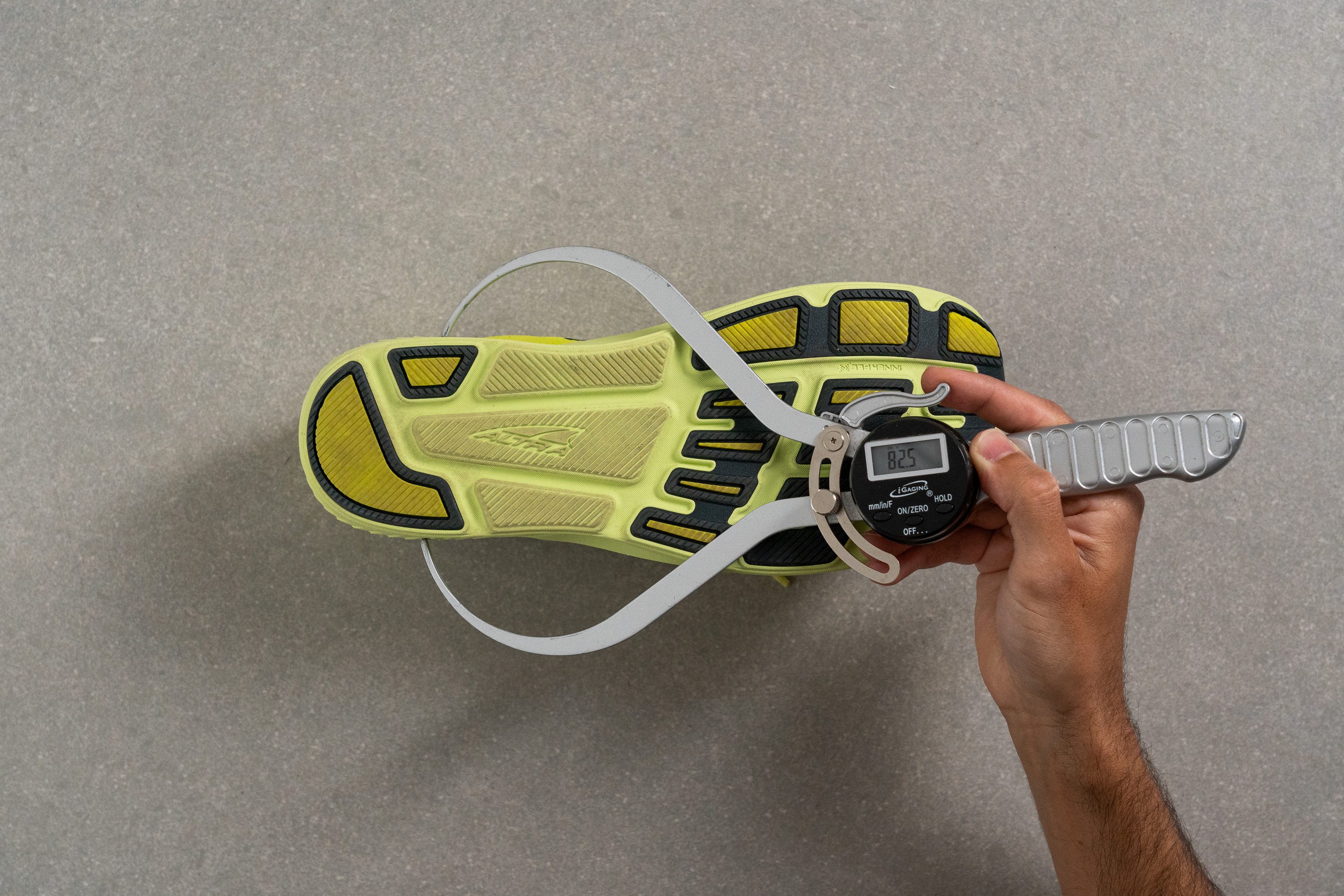
| Escalante 4 | 82.5 mm |
| Average | 90.6 mm |
Durability
Toebox durability
Knit uppers often involve a trade-off between comfort and durability, but the Escalante 4 breaks this mold by being both incredibly durable and exceptionally cozy, scoring 4/5 in our lab.
Kudos to Altra for achieving this rare balance, we're actually impressed!
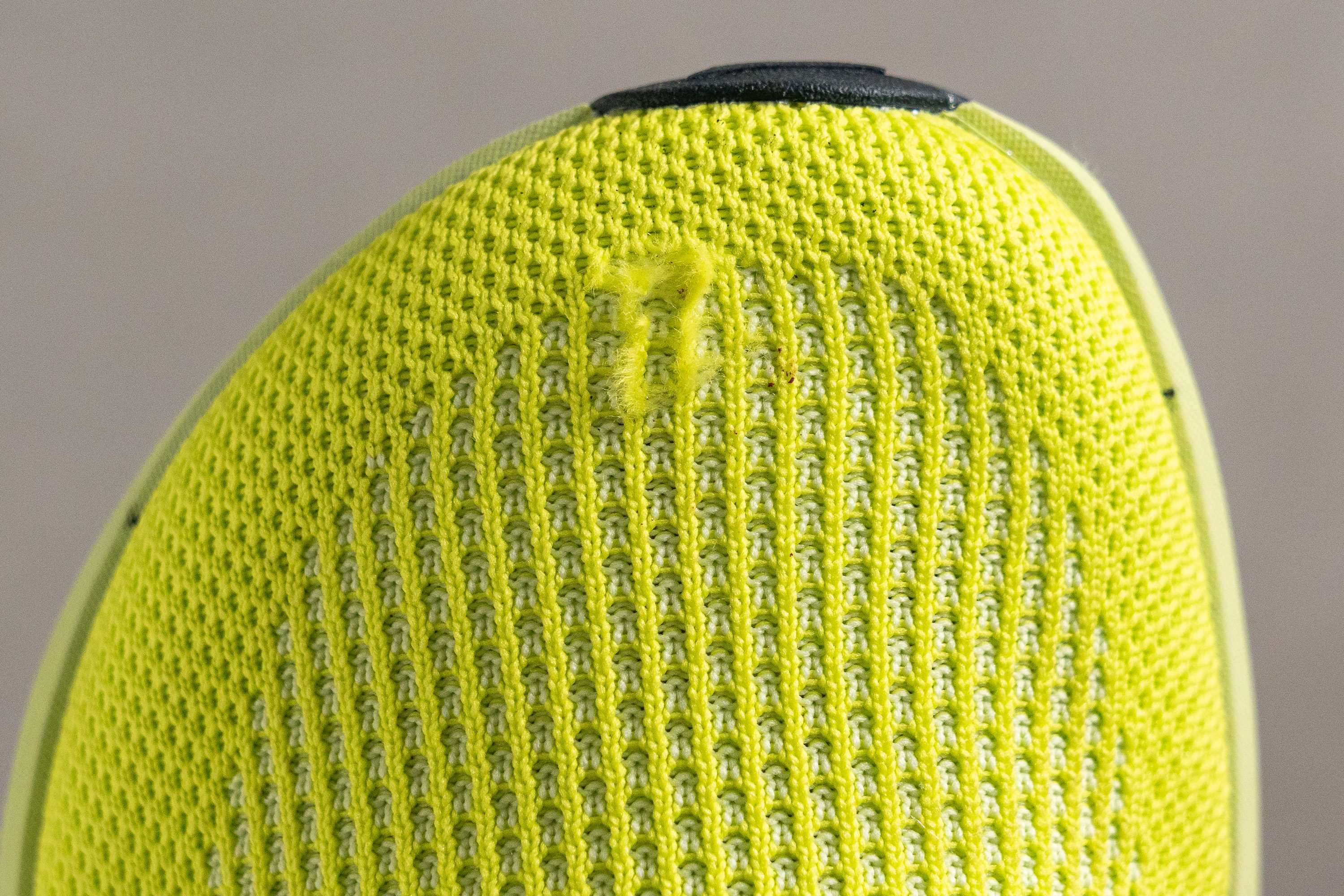
| Escalante 4 | 4 |
| Average | 2.6 |
Heel padding durability
After evaluating the toebox, we shifted our testing to the heel using our Dremel sandpaper tip, another critical area for assessing early wear.
Fortunately, the Escalante 4 impressed us again with another solid 4/5 score, indicating reliable durability in this area—even for those who tend to dig into heel padding quickly.
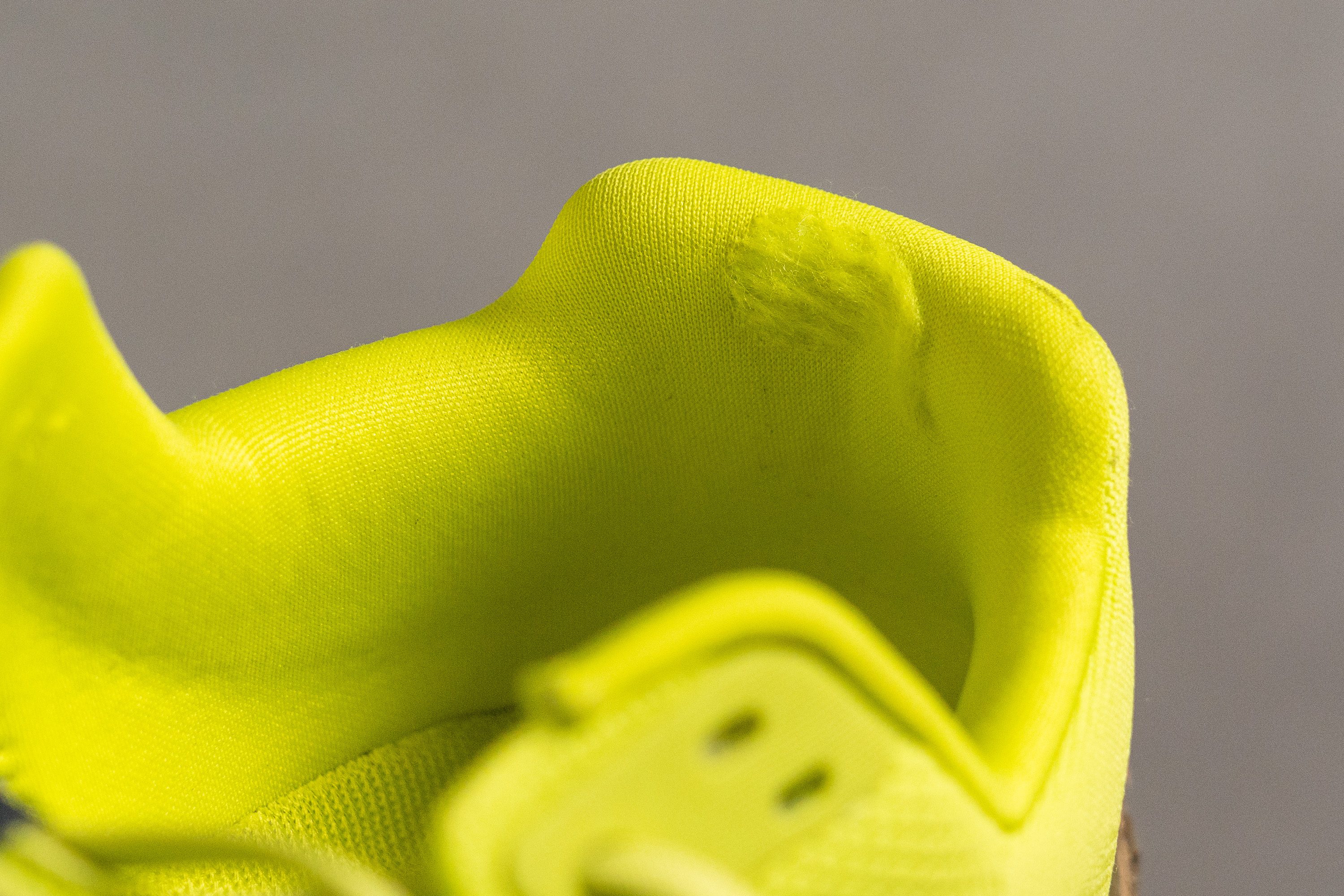
| Escalante 4 | 4 |
| Average | 3.4 |
Outsole durability
The Escalante 4 features an interesting outsole that blends exposed foam with rubberized sections for added toughness and hard rubber in the areas most susceptible to wear.
We were particularly impressed with this design after our latest Dremel test, where the outsole sustained only a 0.3-mm dent. That's an A++ for us!
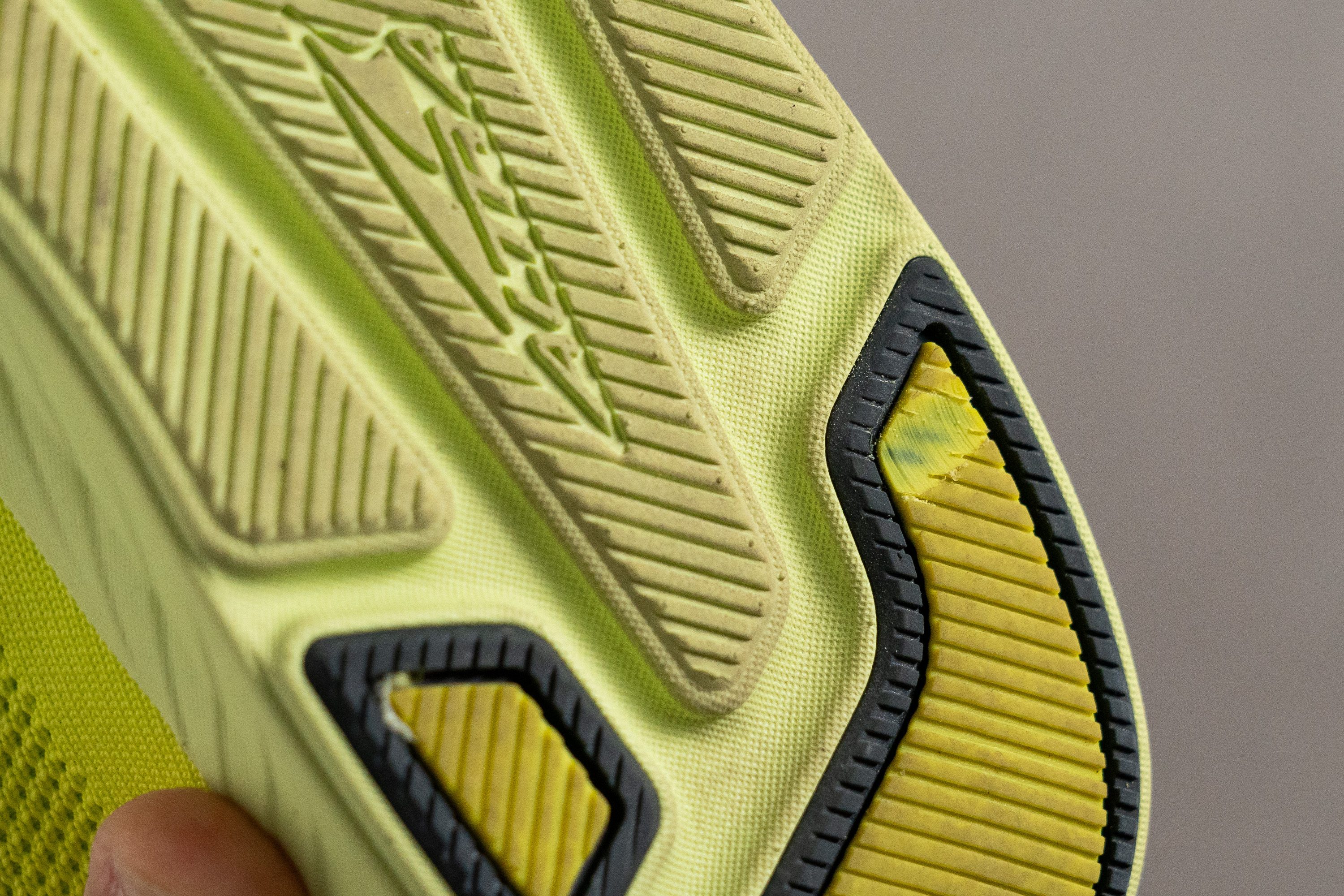
| Escalante 4 | 0.3 mm |
| Average | 1.1 mm |
Outsole thickness
To conclude our analysis of the outsole, we measured its thickness, which registered at a substantial 4.6 mm. However, unlike other shoes that simply layer the outsole over the foam, Altra ingeniously sinks the outsole into the foam.
This innovative approach allows for more rubber without making the shoe cumbersome. However, after observing the toughness of the rubber when it faced our Dremel, we believe that a 4.6 mm thickness is excessive and Altra could benefit from slightly reducing this measurement.
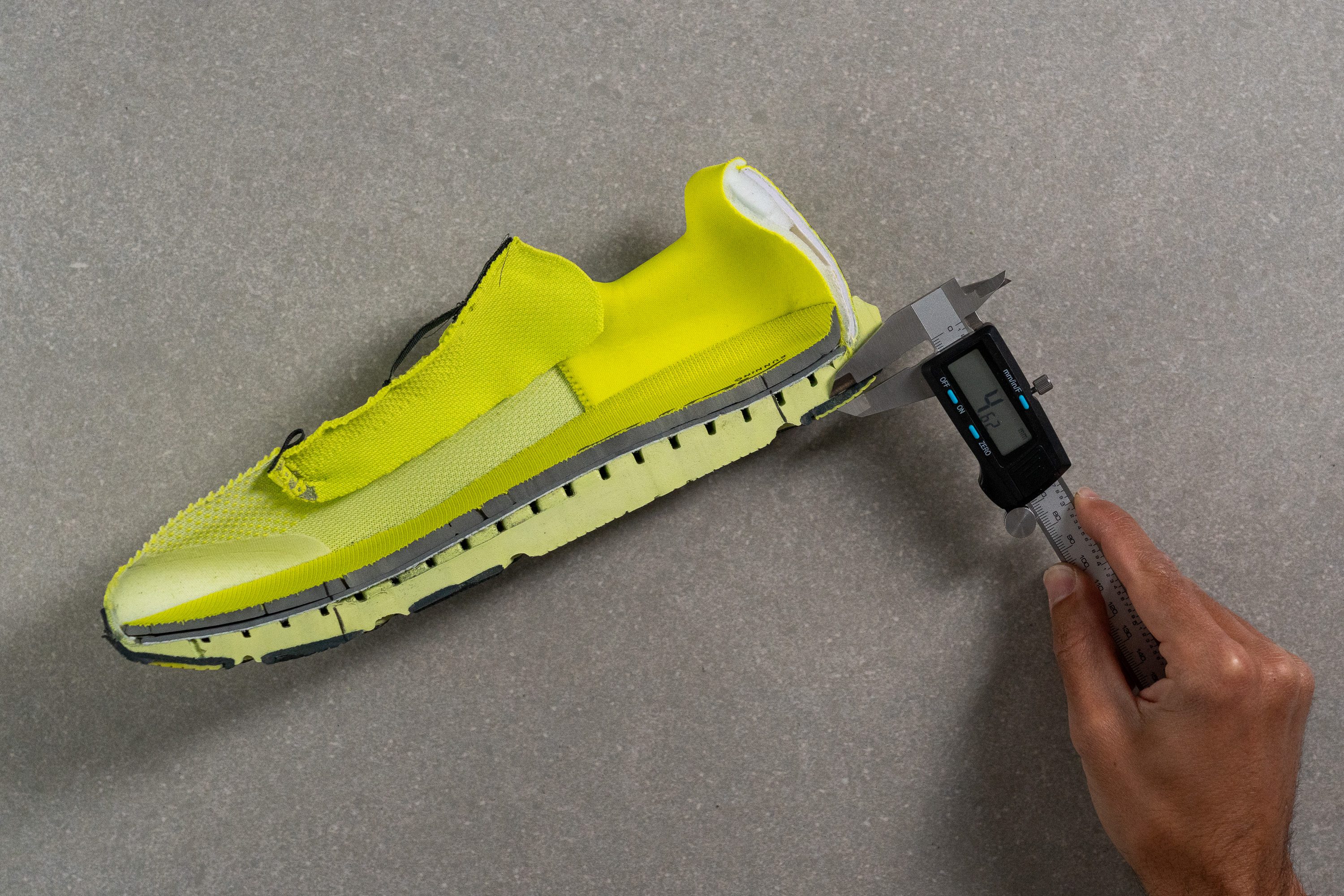
| Escalante 4 | 4.6 mm |
| Average | 3.2 mm |
Misc
Insole thickness
The insole is thick (5.5 mm) and plays a crucial role in the shoe's overall cushioning system.
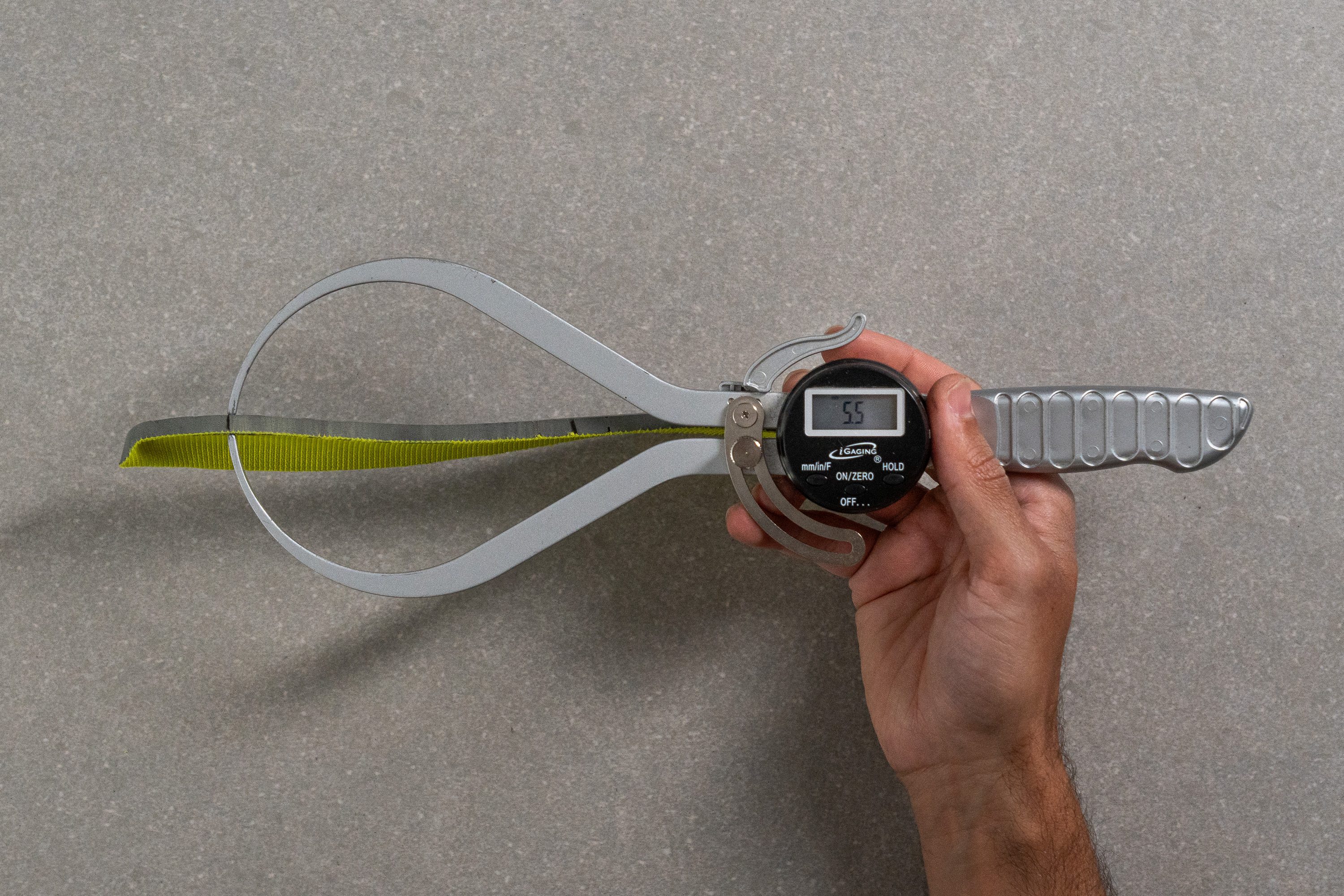
| Escalante 4 | 5.5 mm |
| Average | 4.5 mm |
Removable insole
We discovered that removing the insole from the Altra wasn't an issue since it isn't glued down.
However, due to its distinctively rounded design in the toebox, integrating an insole from a different shoe or custom orthotics may not work well. Oh, and another reason to keep the stock insole is that it's one of the few on the market that is perforated, enhancing the shoe's ventilation.
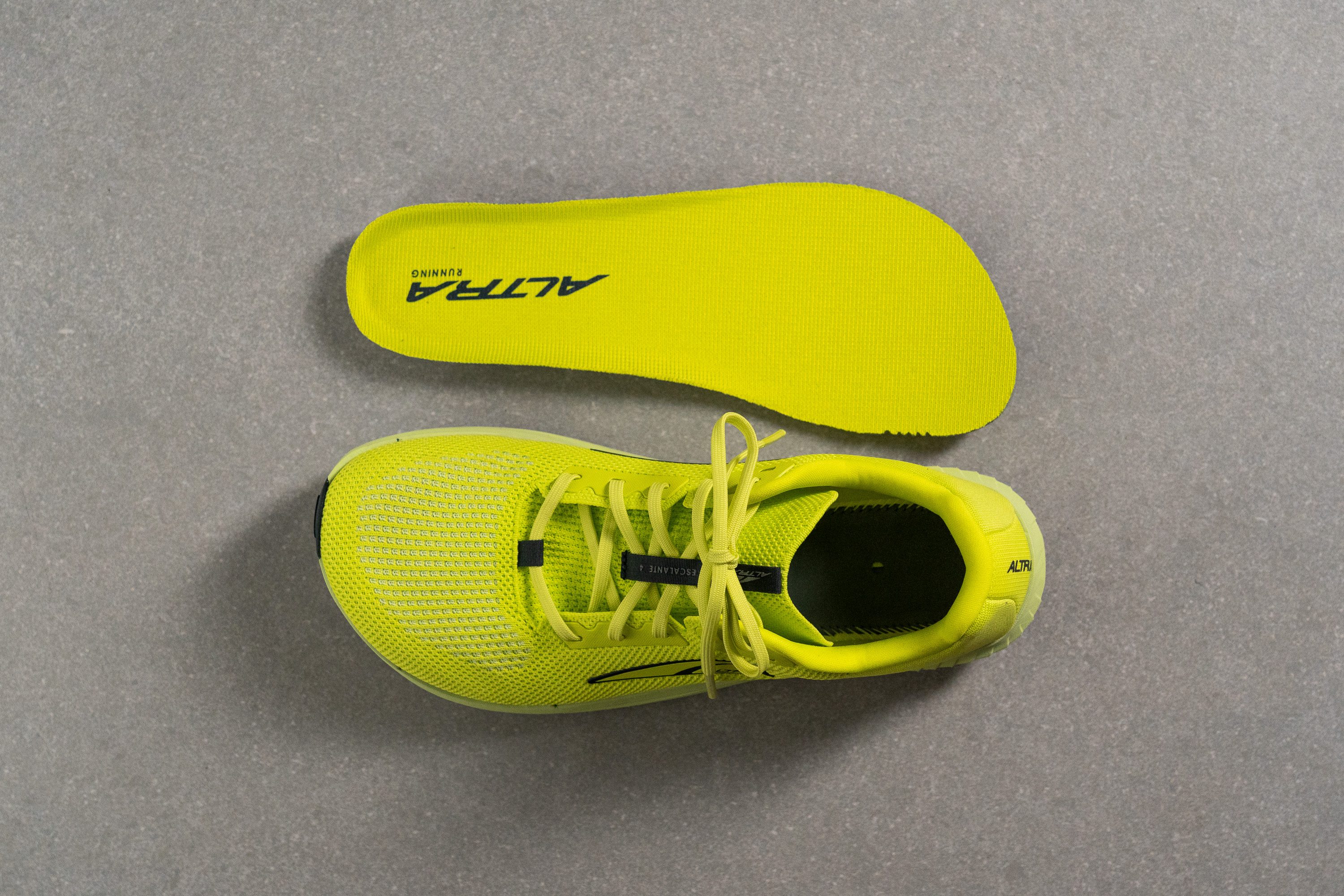
| Escalante 4 | Yes |
Midsole softness in cold (%)
After spending 20 minutes in our freezer, the firmness of the EGO foam increased by 30.6%—a notable performance for a midsole crafted from EVA, though there's still some room for improvement.
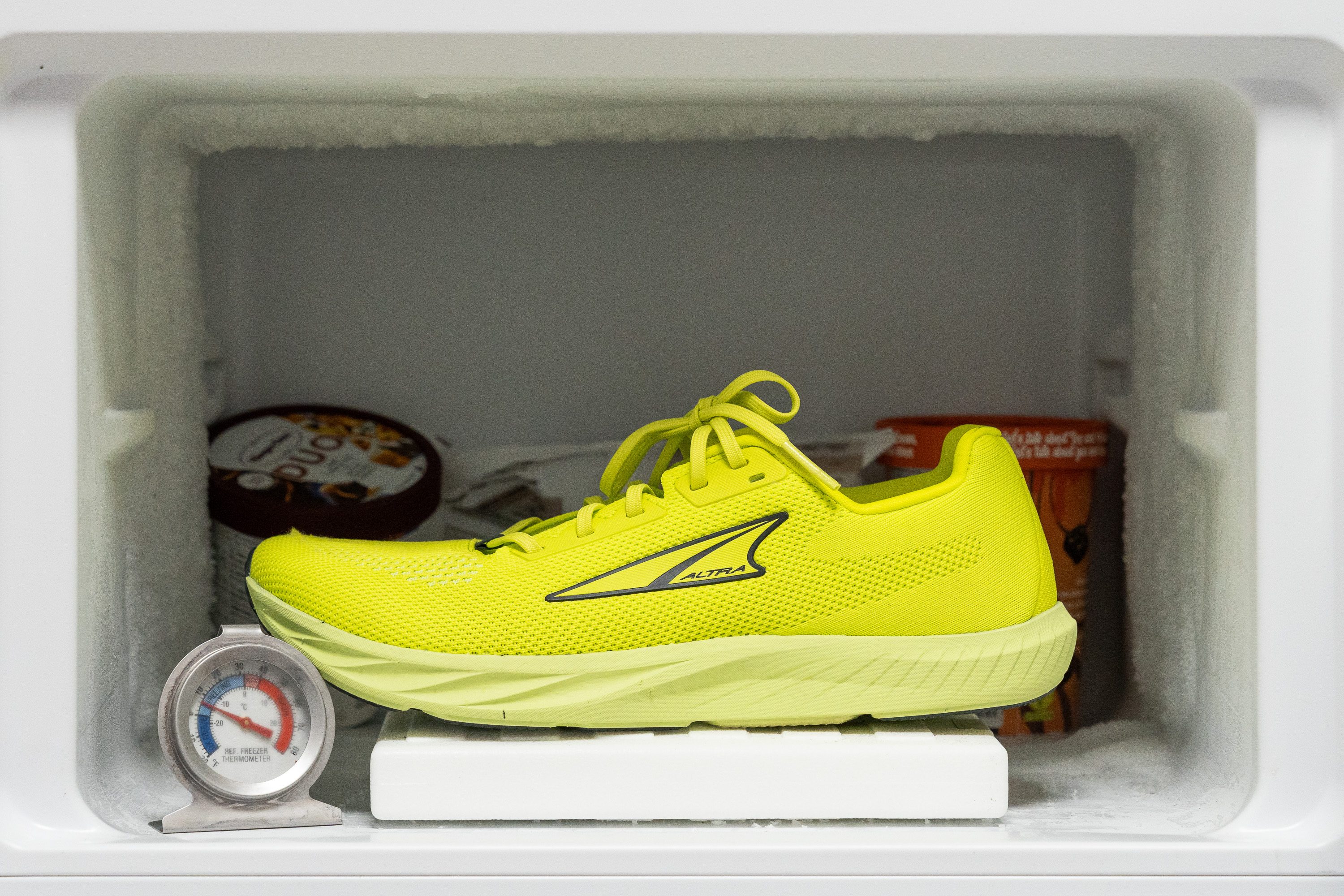
| Escalante 4 | 31% |
| Average | 24% |
Reflective elements
Altra is typically known for adding reflective elements to their shoes. However, our lab evaluation reveals that the lower cost of the Escalante brings some minor drawbacks—reflective features being one of them.
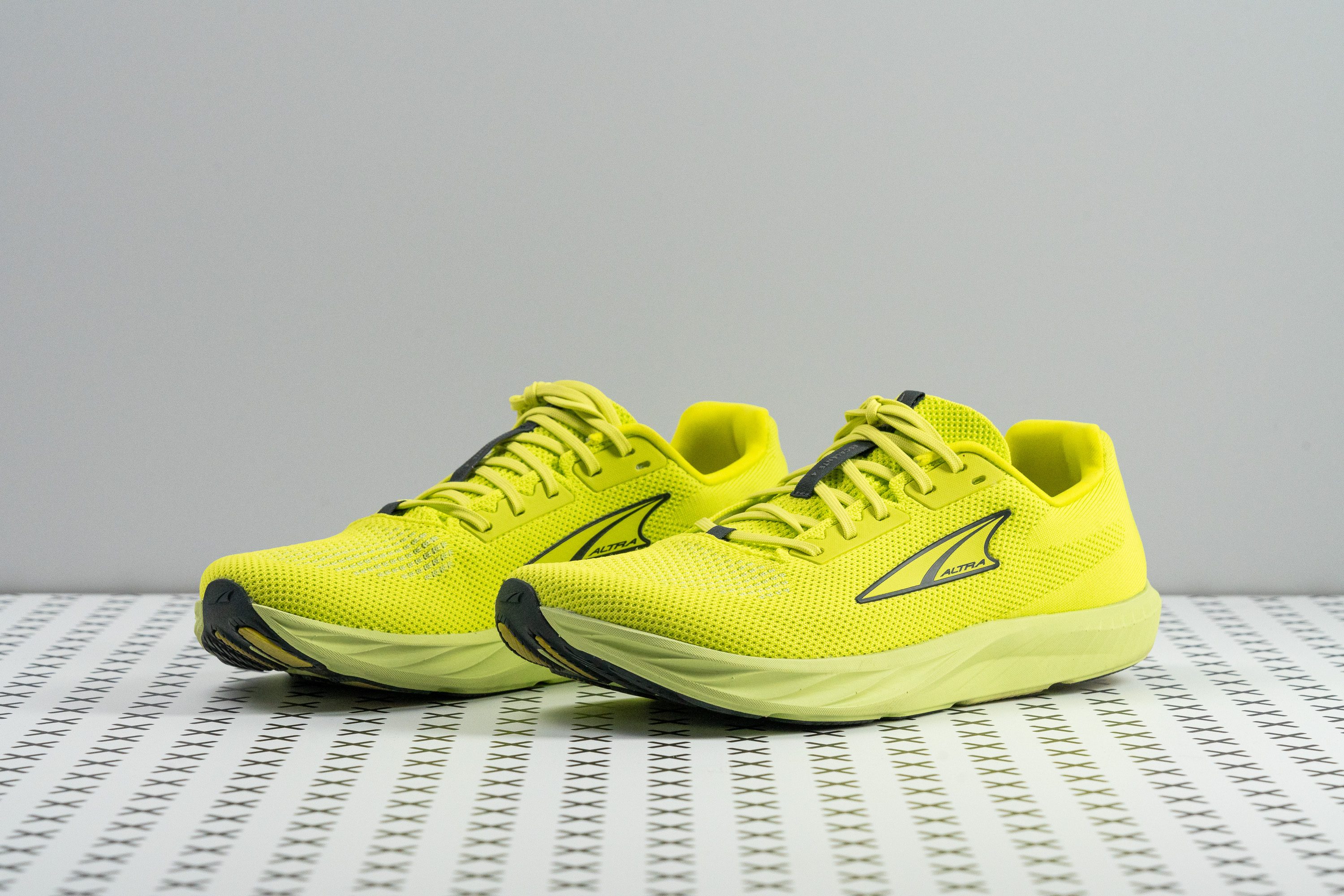
| Escalante 4 | No |
Tongue padding
The tongue of this shoe breaks away from the average design of daily trainers, sporting only 1.5 mm of padding—reminiscent of competition shoes.
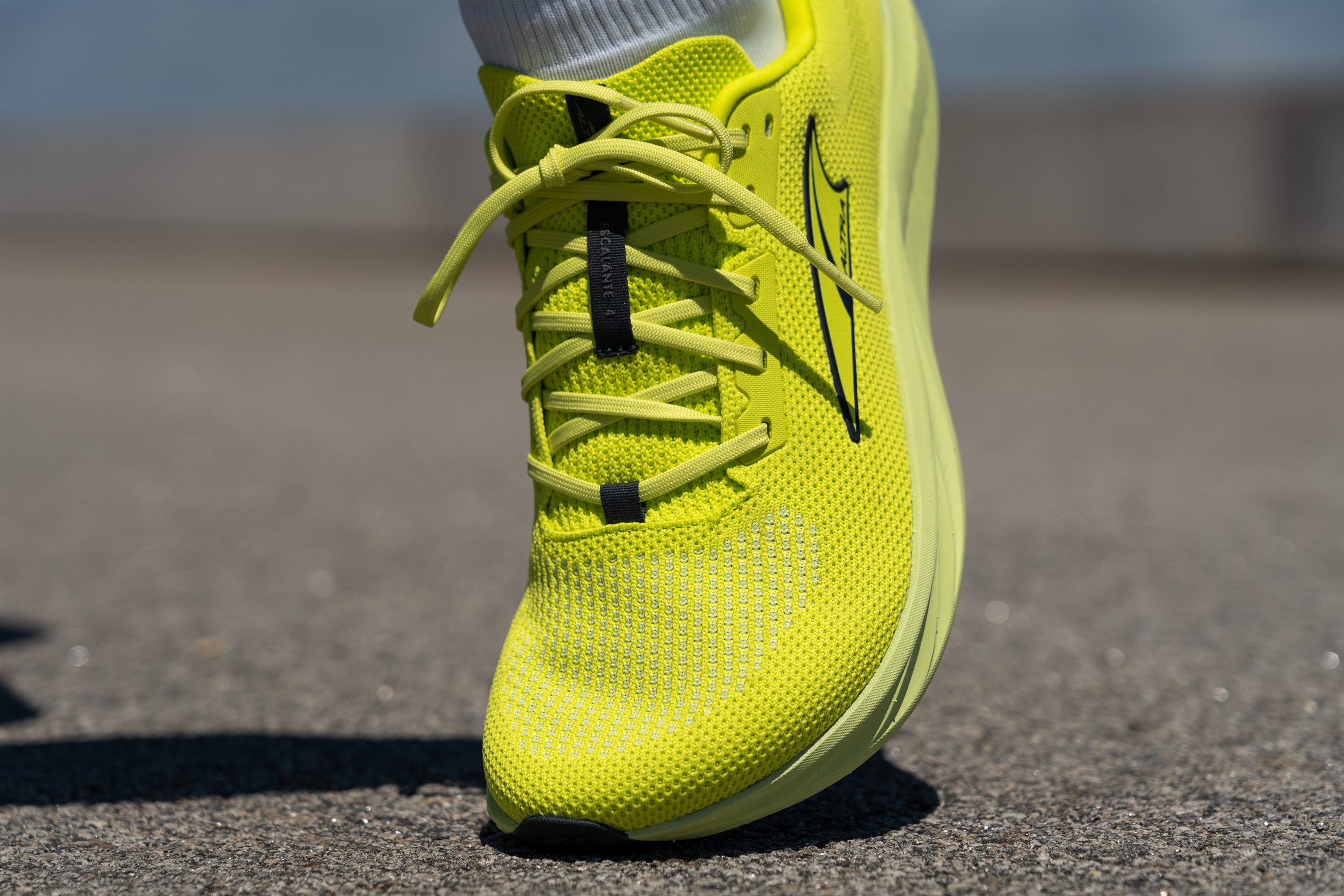
This makes it suitable only for those comfortable with minimal instep padding. Conversely, runners who tighten their laces tightly might face discomfort due to the thin tongue of the Escalante 4. For a cushy option, try the Saucony Kinvara 14, which features a 3.9-mm tongue.
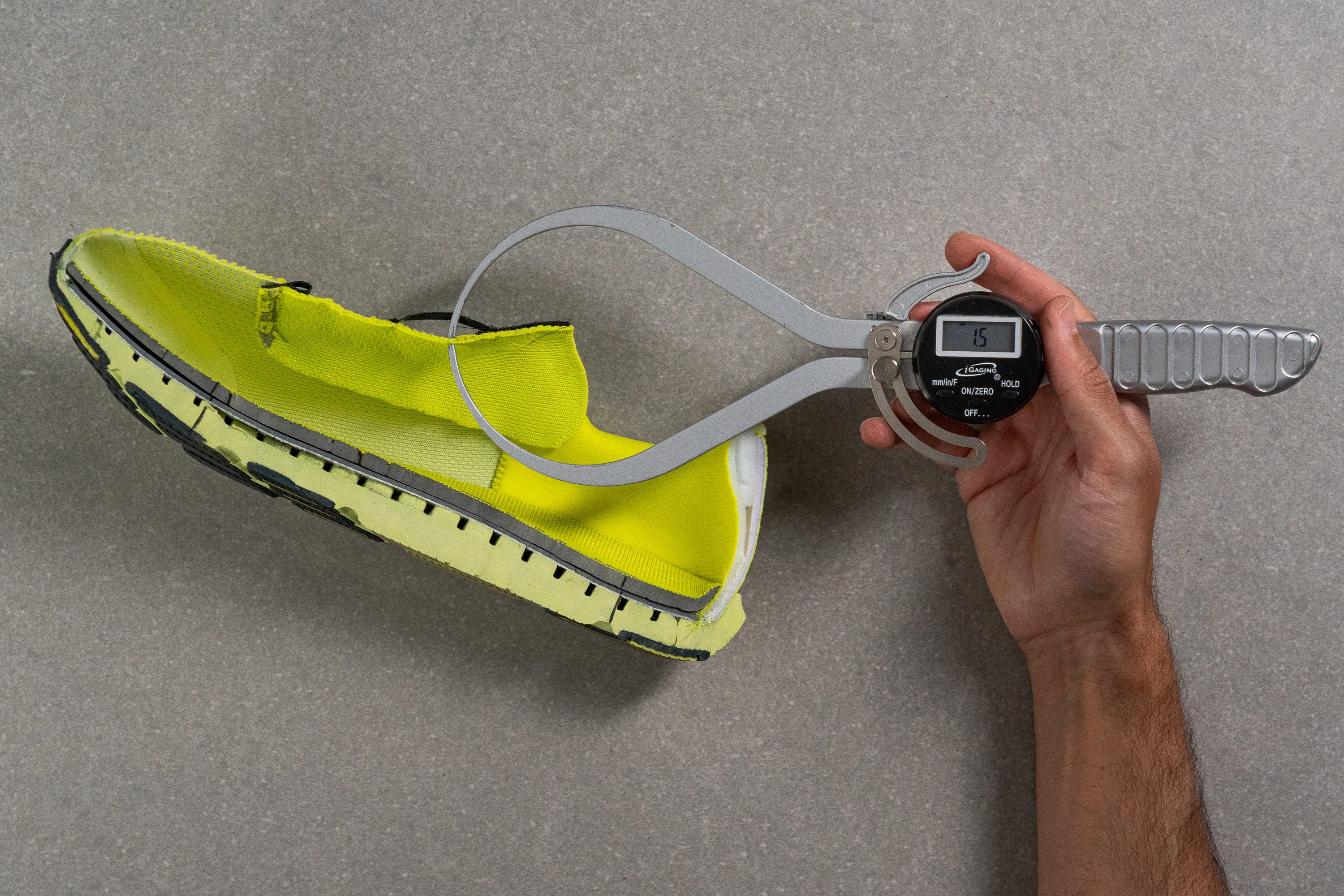
| Escalante 4 | 1.5 mm |
| Average | 5.7 mm |
Tongue: gusset type
Unfortunately, we discovered that Altra omitted the gusset in the Escalante 4, a decision that proved disappointing for us as it would have significantly enhanced the shoe's overall lockdown.
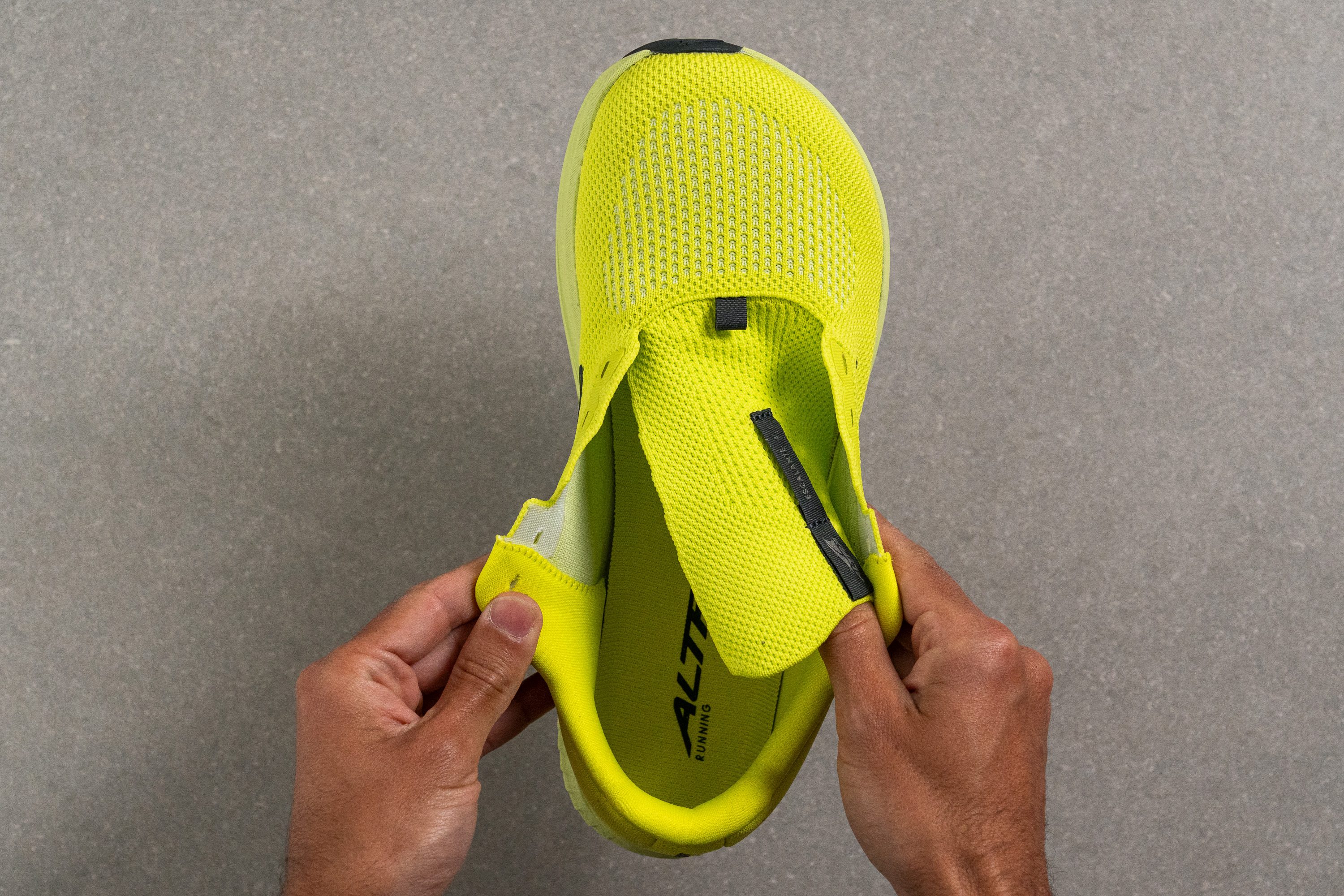
| Escalante 4 | None |
Heel tab
Like many Altra road running shoes, we proved that you won't find a heel tab, and the heel collar isn't extended as it is in Hokas, so we found that slipping our feet into the Escalantes is not as effortless as in other kicks.
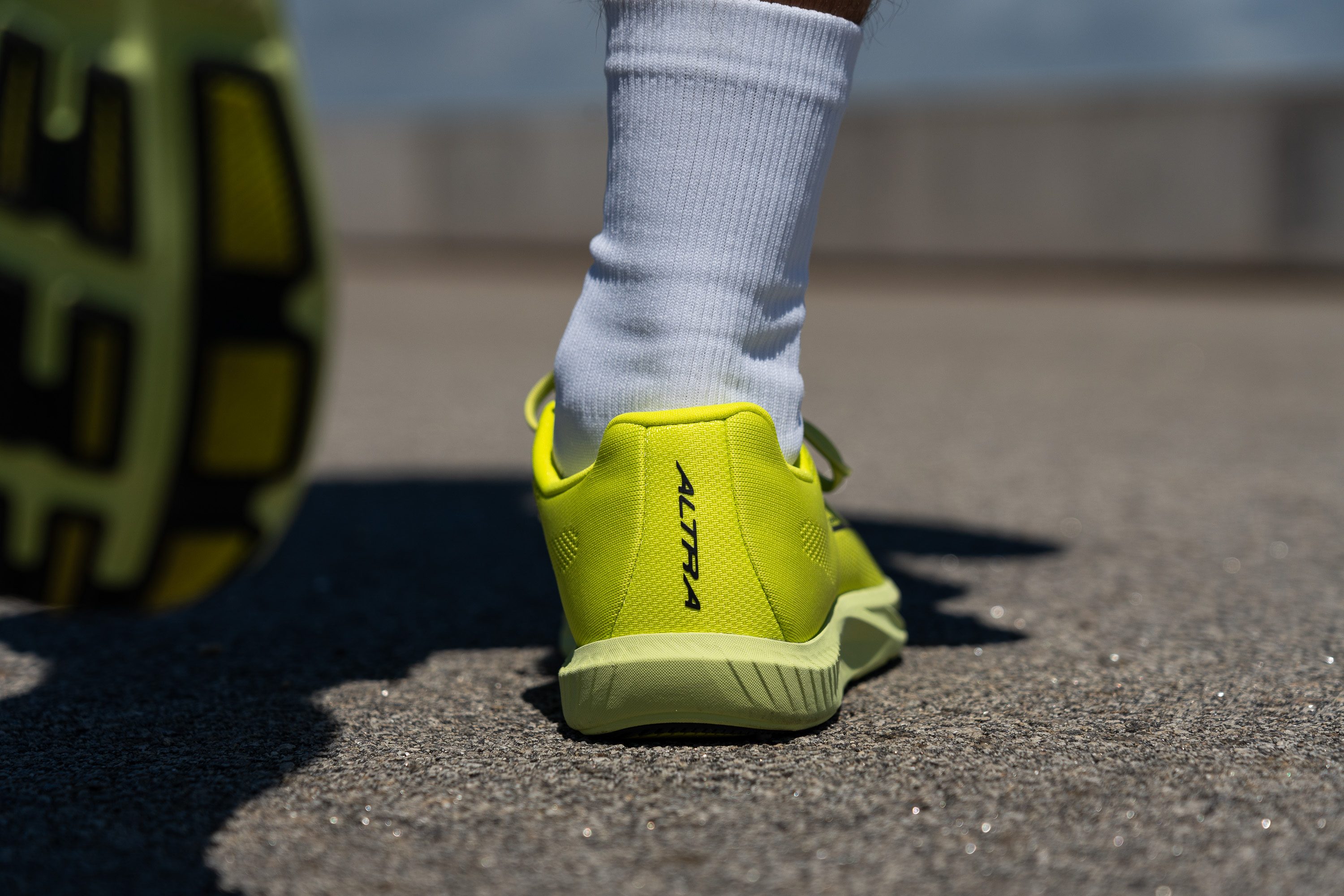
| Escalante 4 | None |

